Students face inconsistencies despite over 90% in-person learning
Jamie Bryson News Editor

This year, a total of 91.1% of UEA’s teaching will be face-to-face, Concrete has found.
Of the rest, 6.1% will be online and a further 2.8% of activities will be asynchronous (online self-study). The news will come as a relief to many, as Schools have updated their taught material in line with the easing of Covid-based restrictions. But, as this investigation has found, our individual views and lived experiences of this change are far from ‘one-size-fits-all’.
As the university points out, “[delivery methods] will vary by faculty, school, programme of study and module choices made by students”. Through figures provided to Concrete by the university, several such variations can be highlighted. For example, the School of History will be receiving 100% face-to-face teaching, compared to the School of Medicine at just 58.7%.


However, the university emphasised to us “Schools with a higher level of online teaching (which tends to be health-related courses in the FMH or SCI faculties) is a result of their offers including courses or modules which are designed to be fully online, catering for students who also have jobs- for example, the newly qualified pharmacy training programme and apprentices in biomedical NHS laboratory settings”.
Whilst such examples have remained relatively consistent in recent years, many students may be aware of recent concerns raised by Psychology students entering their second year, having been told they will see increased online learning across their course. We spoke to one such student
(who wished to remain anonymous) about their experience with online learning within the school.
The student began by telling us, “three out of five of my lectures are online and on one single day, with only one timetabled break in between the fourth and fifth hour of teaching. In total, I have six hours worth of lectures on that day”.
When asked what effect this might have on their learning experience, they responded, “I personally find it really damaging to my mental health when given no choice but to spend all day in my room on a computer screenit can be really hard to focus in online lectures, let alone six hours of them”.

While many may feel this impact, it is also important to consider that some students have certain accessibility or practicality requirements that recent technological advancements have aided.
In considering this, the student emphasised, “I feel a much better way to do this [providing online learning] would be for the uni to live-stream lectures- giving everyone a choice between attending in person or remaining at home”.
The university subsequently told us it is considering options for this, explaining “UEA is investing in more learning technology tools, including the lecture capture software ‘ECHO360’. For the first time, captures [focusing in on individuals who speak] can happen automatically within a learning space, provided the lecturer has opted into the service”. This would address reported difficulties with sound quality and subsequent lack of interaction from students watching lectures online.
As part of ongoing discussions between the university and the Student Union on learning experiences, Taylor Sounes- SU Officer for Undergraduate education- described to us that “Ultimately everyone has their own views based on their own experiences and personal preferences- that’s the key with all of this”.
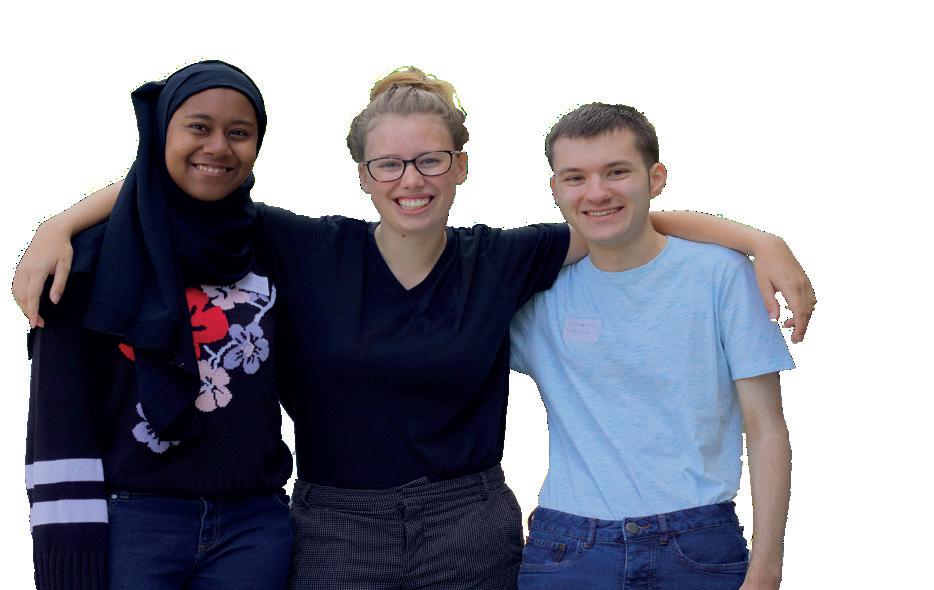
Asked about concerns raised over mental health in balancing online and in-person delivery, she added,
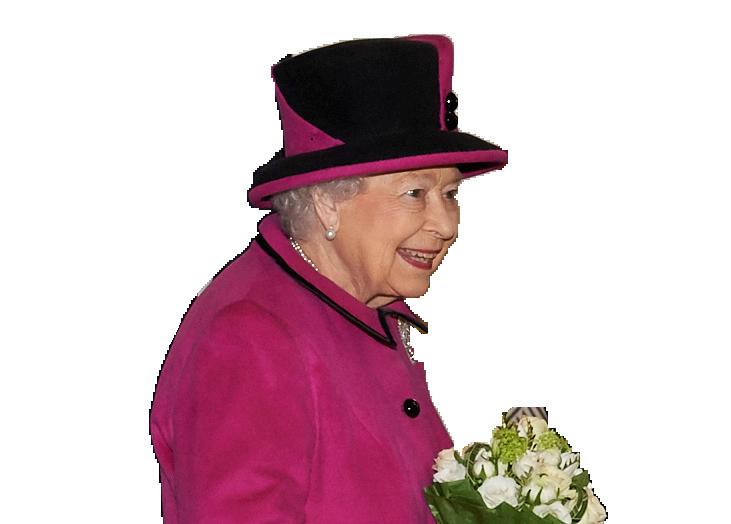
“There are benefits and drawbacks of blended forms of learning- specifically the new online methods- for different groups and different courses. The SU is working hard to ensure all voices are heard”.
The issue will undoubtedly continue to be discussed throughout the coming academic year, as students and staff adapt and gain further experience in new technology and working practices.
Finally, Taylor emphasised, “Most importantly- talk to your school, your head of department and your module convener about your learning experiences. They should be able to discuss your course specifics and if they don’t or you don’t feel satisfied with their response, please get in touch with me and the team and we’ll help you get the answers you’re looking for”.
Photo: UEA, Percentage of face-to-face, online and asynchronous activity by School h
The official student newspaper of the University of East Anglia | Established 1992 | Issue 388 | 21st September 2022 pg. 4
Welcome back, UEA pg. 2 Remembered: Her Majesty Queen Elizabeth II Venue: Visions of Ancient Egypt at the Sainsbury Centre pg. 5
A big Concrete welcome (back) to the Home of the Wonderful
Libby Hargreaves Editor-in-Chief
Please accept a big Concrete welcome to the Home of the Wonderful, from myself and the rest of the Editorial team.
I am not even halfway into my own UEA experience, having just started my second year as a Culture, Literature and Politics student.
Never in a million years would I have believed you if you'd have told me this time last year that I'm Editorin-Chief. I have hard work, good friends and my inability to say no to thank, though all are secondary to the debt I owe the Concrete culture.
We uplift one another, we laugh and cry together, and I believe this year's exceptional Editorial team will prove this energy cultivates success.
I encourage all newcomers to get involved with Concrete and the wider Media Collective (hi Livewire & UEATV). As well as expanding your portfolio and trying something new, we have lots of exciting events
to get stuck into this year, and who knows, you may be the next Editorin-Chief.
As I write my first editorial, I am sitting in the media office looking out into the Square in anticipation of the influx of students, both new and returning, who will fill the campus by the time this issue is sent to print.
This issue is, in-part, dedicated to all those new to UEA's concrete jungle. Perhaps you're nervous though excited for a new chapter, or maybe you're making the best of a secondchoice decision. Either way, we welcome you.
I hope you find what you're looking for, though if you're stuck you can now find a handy 'What's On' guide to LCR events, public lectures, art collections and much more on page nine. Our Home of the Wonderful section has also moved closer to the front of the paper, to represent the importance of maintaining the student element of 'student newspaper'.
Keep an eye on our social media


pages for updates and events, including our Big Meet- where you can find everything you need to know about vacant roles, who we are, and how to get involved.
Concrete has been provided with a range of challenges to digest this academic year, including the ongoing energy crisis, the death of the Queen, international conflict and our new Prime Minister.
A theme of new beginnings is apparent, not only in universities across the country but also in politics globally. We have come through the otherside of the pandemic, for better or worse, with a new government and monarch, as a non-EU country and with new issues facing us.
This is our time, as students, to prove ourselves as the future of this country: as new leaders, new teachers, new nurses, new thinkers.
I'll leave you with some wise words from my dad, who is my stability through all this change; "you are exactly where you're meant to be, just be the best you can be."
Where 'it seems cool' can take you
Badriya Abdullah Deputy Editor
During sixth form, a teacher asked me where I’d like to be in the next few years. “I don’t know”, I answered. They shrugged and said, “some of the most interesting people don’t know what they’ll be doing in the next few years.”.
I’m not about to say I’m the most interesting person in the world, but I’d like to argue that pursuing what you like always leads to interesting situations.
I’ve always loved art and that interest led me to graphic design. I played around with it in my spare time (all hail Canva) and found a different way to be creative. I never thought it would lead to
anything until I saw Concrete’s recruitment posts for their 21/22 team.
I applied for the Social Media Manager role just to see what would happen. Shortly afterwards, I wrote my very first article (after dealing with a lot of self-doubt) in time for team introductions, and it’s still my absolute favourite.
There was burnout, agonising art block and some tight deadlines, but there were also fun times and lots of learning to be had. Now, over 50 Instagram posts and a few articles later, I’m a deputy editor and part of an amazing team.
I’m writing this on a train and I’ve become very reflective. Throughout my life, I’ve done a
bunch of ‘random’ things with the reason “eh, it looks cool” and trusted that it would lead me somewhere, anywhere. It’s taken me this far, and now I’m wondering where else it will take me.
What I’m trying to say is that everything you’ve done, are doing, and will do, will become a breadcrumb in your life. They all form paths in front of you. Some of those paths will be dead ends, others will let you do things you would never imagine, but all of them will intertwine with each other. They will all influence you, teach you, and guide you.
With that, I’d like to welcome you (and in a lot of cases, re-welcome you) to UEA, to Norwich and to a world of opportunities.
Just getting started
Matthew Stothard Deputy Editor
I’m starting this without a clue what I’m going to say.
To be fair, that’s how I start a lot of my articles, and they usually turn out alright in the end! Sometimes I plan, but often it’s easier to just get writing and see what happens. There, that’s one paragraph done already!
Welcome to Concrete! If you’re new to UEA, I hope you’re settling in okay. Starting university can be such an exciting time, but it can also be really challenging. Always try to be kind to yourself, never be afraid to reach out for help, and give everything that interests you a go. I joined Concrete at the start of First Year and now here I am two years later as a Deputy Editor- you never know where the things you try now will take you!
If you’re returning to UEA, like me, welcome back, I hope you’ve had a lovely summer! I also hope you’ve had a better time of moving back than I have- I’ve already had no hot water and no internet, and I’ve only been back for five days! Despite these slight hiccups, I’m excited for the year ahead, and I hope you are too.
Thank you for picking up this issue and giving us a go! We are living through challenging times right now, and I hope we can provide you not only with clear, reliable information, but also a bit of fun to keep you entertained.
I am so proud of what the whole team, Concrete and Venue, has already achieved, and I look forward to growing our happy writing community in the weeks ahead!
The University of East Anglia’s Official Student Newspaper since 1992
Wednesday 21st September 2022 Issue 388 Union House University of East Anglia Norwich NR4 7TJ 01603 593466
www.concrete-online.co.uk
Editor-in-Chief Libby Hargreaves concrete.editor@uea.ac.uk
Deputy Editors
Badriya Abdullah & Matthew Stothard
News
Jamie Bryson Home of the Wonderful Ronaldo Martins
Senior Writer: Alexandra Ashby Global Leo Henry Features Sienna Norris Comment Eve Attwood Science George Barsted
Travel & Lifestyle Finlay Porter Sport Dan Laughlan Senior Writer: Drew Murphy
Breaking News Jamie Bryson Leo Henry
Online Editors Kanon Higashi
Concrete Photographer Prakrita Rahman
Venue Team Louise Collins Lily Boag Ray Khawaja
concrete-online.co.uk
ConcreteUEA
ConcreteUEA
Front page cut-outs: (left) Prakrita Rahman; (centre) UEA; (right) Rosie KyrinWhite
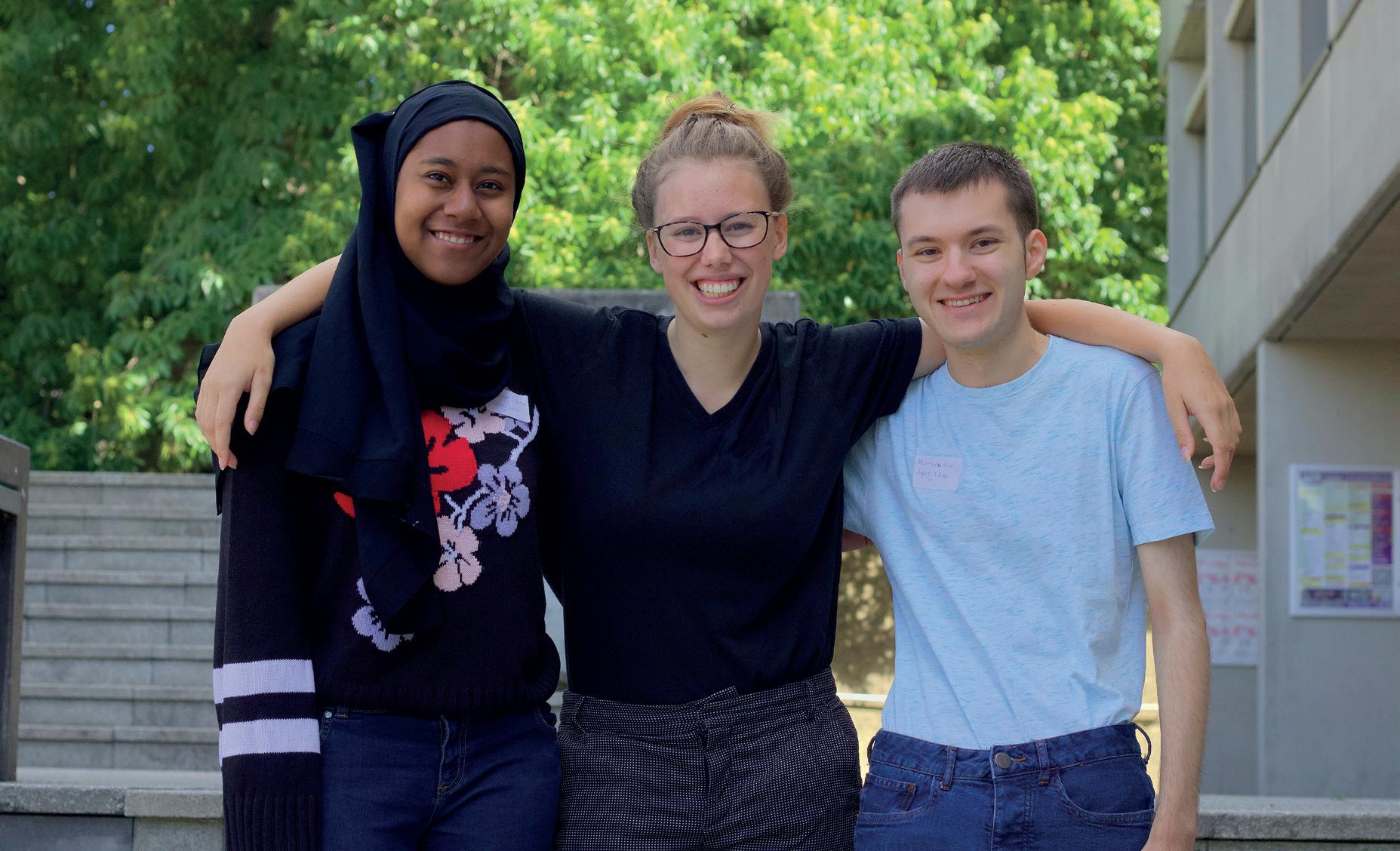
Rosie Kyrin-White Daze Constantinides Clem Hailes
Tshequa Williams Tabi Fielding Jessica Clifford Tom Porteus Millie Smith-Clare Alexandra Ashby Rory Kettle
Editorial Enquiries, Complaints & Corrections concrete.editor@uea.ac.uk
No part of this newspaper may be reproduced by any means without the permission of the Editor-in-Chief, Libby Hargreaves. Published by the Union of UEA Students on behalf of Concrete. Concrete is a UUEAS society, but retains editorial independence as regards to any content. Opinions expressed herein are those of individual writers, not of Concrete or its editorial team.
Photo: Wikimedia CommonsPhoto: Concrete- Prakrita Rahman
21st September 2022Editorial
Remembered: Her Majesty Queen Elizabeth II
The death of Her Majesty Queen Elizabeth II will have come as a shock and with great sadness to many of us at UEA, across the country and around the globe.
The 96-year-old monarch - who reigned for a record 70 yearspassed away on the afternoon of Thursday 8th of September at the family’s Balmoral Estate in the Royal Deeside region of Scotland. It was reported that King Charles - her eldest son and heir - along with her only daughter, Anne, Princess Royal, were at her side.

A statement was made by Buckingham Palace at 12.30BST advising that Her Majesty was “under medical supervision” amidst “doctors' concerns” over her health. The nation waited on tenterhooks throughout the afternoon, with private letters being seen passed to the Prime Minister and the Leader of the Opposition live on Parliament TV.
A solemn and intense atmosphere of speculation clouded the various national News channels with presenters
dawning black suits and reporting on the various travel plans of each member of the immediate Royal family who began congregating at the Balmoral Estate throughout the afternoon.
A further statement was finally announced by Buckingham Palace at 18.30BST that read: “The Queen died peacefully at Balmoral this afternoon”.
Tributes and commemorations have been flooding in from leaders and diplomats across the globe.
US President Biden wrote on the official White House website on the evening of HM’s passing, “In a world of constant change, she was a steadying presence and a source of comfort and pride for generations of Britons, including many who have never known their country her. Her legacy will loom large in the pages of British history, and in the story of our world”.
Nigerian President Muhammado Buhari remarked, "The story of modern Nigeria will never be complete without a chapter on Queen Elizabeth ll, a towering global personality and an outstanding leader. She
dedicated her life to making her nation, the Commonwealth and the entire world a better place."
In a personal message to King Charles, the Dalai Lama wrote, “Her reign, as Britain’s longestserving monarch, represented celebration, inspiration and a reassuring sense of continuity for so many people alive today. Your mother lived a meaningful life with dignity, grace, a strong sense of service and a warm heart, qualities we all should treasure.”
Queen Elizabeth’s state funeral was held yesterday, Monday 19th September at Westminster Abbey in London.
The Queen and UEA
Throughout her long reign, Her Majesty paid three memorable visits to UEA, the first of which was in 1968.
The monarch was given a personal tour of the campus, accompanied by founding Vice-Chancellor, Francis Thistlewaithe CBE. Still in its developmental stage, Her Majesty can be seen in the above image (which hangs framed on the first floor of the Hive) with an intriguing expression on her face whilst surveying the now grade two listed Lasdun Wall building.
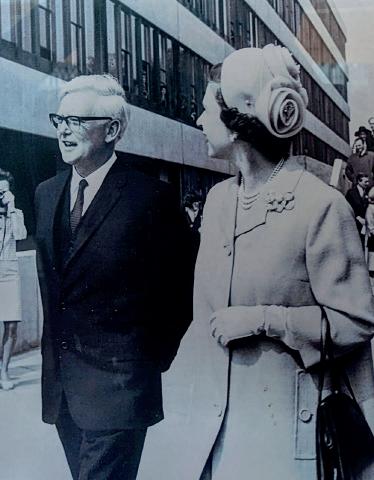
In 1994, Her Majesty returned to campus to open a new centre for the training of occupational therapists and physiotherapists, named The Queen’s Building, which still stands today on Chancellor's drive. Accompanied by Prince Phillip, the royal couple also took time to speak with local onlookers including students and staff, as seen in the bottom right image
The Queen’s third and final visit to the Home of the Wonderful came in 2017 when she was given a tour of the ‘Fiji: Art & Life in the Pacific’ exhibition at the Sainburys Centre by exhibition representatives and accompanied by current ViceChancellor, David Richardson, as
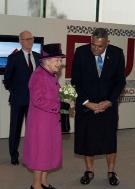
pictured immediate right Once again, crowds of students, staff and local school children gathered outside the building to welcome her onto campus.
In a tribute to the late monarch posted on the UEA website on the evening of her passing, ViceChancellor Richardson said, "Her Majesty has been a most welcome guest visiting our campus on a number of occasions and taking a keen interest in the University’s development. Queen Elizabeth II will be sorely missed as a leader of our country and as a good friend of our University; our thoughts are with the Royal family at this time”.
Norwich rental boom
James Hawketts News Writer
Norwich’s rental market is once again on the rise - caught in a pincer movement of heated demand and ever-increasing energy costs. House prices are inexorably tied to rent, as landlords often try to make a proportionate return on the value of their property and are hitting record highs nationwideexperiencing 12.8% growth in the year leading up to May 2022, according to the Office for National Statistics.
This phenomenon has not passed Norwich by, with house prices up a staggering 20% in NR7 and rents at an all-time high, as the continued trend away from the London commuter belt towards larger workat-home residences bites into our city. With budgets tight, and wealthier competitors moving into the area, it may prove difficult for students to compete for space.
As the housing market demands more and more of our cash (an average 10% rental rise across Norwich), there are warnings that the increases are already vastly unsustainable for student finances.
The BBC reported in August that 4-in-10 of under-30s are already paying more than 30% of their income in rental costs - an income that itself has been falling in real terms.
Despite pensioners (1-in-4 of whom are millionaires) receiving an above-inflation pay rise through the triple-lock pension scheme, and workers from across the public sector continuing strike action over below-inflation pay offers, students have received zero increase in maintenance grants for the coming year.
The group will also be hit with real-term increases in income tax, national insurance, and tuition fee repayments. Dubbed “generation rent”,
students will likely bare the greatest burden of rental increases with predominantly older and wealthier landlords seeking to protect their incomes from inflation.
Vice-President of the UEA Economics Society, Wendy Tu, comments, “The government is not intervening enough to help with the housing costs, especially with the rise in energy bills. I worry that some students may reconsider studying at university as a result and that those who are having difficulty finding affordable housing may have to skip the academic year”.
If you are struggling with housing and financial issues the university and the Students Union provide specialist assistance for financial and/or mental health that you may be eligible for – search
‘Wellbeing’ on MyUEA for a variety of helpful forms and advice.
Jamie Bryson News Editor
Photo: UEA
Photo: UEA
Photo: UEA
3 News 21st September 2022 concrete-online.co.uk/news/ | @ConcreteUEA
Fresh refurbishents across campus
Eve Attwood News Writer
Over the summer, multiple refurbishments have taken place across the UEA campus. As we enter a new academic year, you may notice a few of these changes.
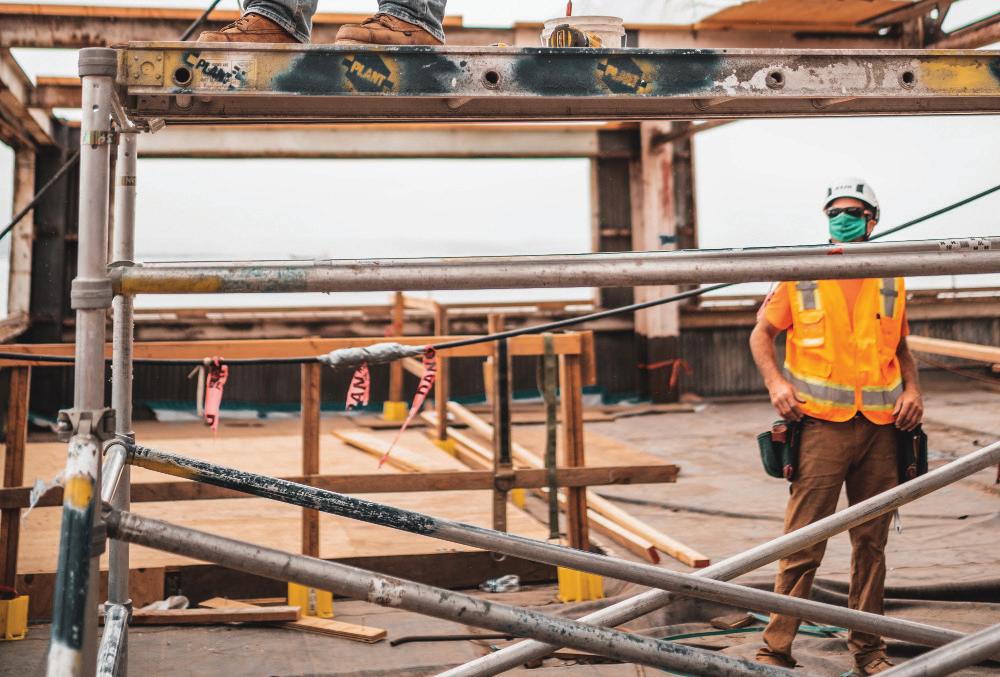
Unio was closed temporarily from the 1st to the 25th of August in order to undergo vital flooring repairs. According to Unio’s Instagram, students can also expect ‘some exciting changes’ after a ‘refresh’ to the Unio space.
After much anticipation and disruption to those previously
accommodate there, work on Norfolk and Suffolk Terrace began in late March and is set for completion by late September. Changes include fire compartmentation works and the conversion of Suffolk Terrace C tower from office space to student accommodation. On behalf of UEA, Aspect contractors are aiming to incorporate “contemporary upgrades” to the accommodation block which still pay tribute to the iconic 1960s buildings designed by Denys Lasdun.
From late February 2021, a programme of internal and external refurbishment works has been taking place at the INTO UEA building. These works have included ‘internal refurbishment’ of student bedrooms which are due to be completed this September. Further development of the communal land around the building is ongoing - details of which can be found on the Site board opposite UEA Nursery.
After some debate over its appropriateness earlier in the year, Schools within the Faculty of Arts and Humanities will be moving from the old ARTS Hub to the Registry - now officially the Arts and Humanities Building. This move will be in place
until at least 2025 whilst the original ARTS hub - part of the Lasdun Wall - undergoes urgent refurbishment and repair.
A brand new Sportspark gym was unveiled on the 27th of August. Refurbishments included new machines, flooring, strength and conditioning areas and new visual
graphics featuring local athletes. Sportspark has also introduced new options for users, including ‘PowerMill’ stair climbers, ‘HD Tread’ curved treadmills, an ‘Air Bike’, a reconfigured ‘Synrgy’ rig,
upgraded resistance machines and a plate-loaded linear leg press.
Furthermore, if you’re a fan of weightlifting, you’ll be pleased to know that the free-weight provisions have also been extended - not just on the main gym floor, but also in the new Strength and Conditioning performance area. UEA Staff can also benefit from the new Staff Weekday Silver membership which has been designed ‘to recognise the move towards more flexible working patterns.
And finally, earlier in September, the benches in Red Bar have been reupholstered as a minor refurbishment to the BarSU. New and returning students will benefit from improvements to campus accommodation with a wider variety of rooms to choose from, and modern refurbishments to the interior.
For student and staff wellbeing, refurbishments to the Sportspark gym allow users to create greater variety in their exercise routines. The refresh comes just in time for the new
academic year and for a new wave of UEA students.
Mixed experiences at Graduation 2022
Louise Collins News Writer
This year’s graduation was unlike any other at UEA, with three years worth of graduating classes spread over two weeks, as a result of the pandemic. With the ‘hottest days of the year hitting us at the beginning of the celebration period, organisers faced several additional logistical challenges.
Following the first week of ceremonies, concerns and questions were raised by students and family members over a number of event policies including graduates being told not to wear gowns and mortar boards outside of the official festival area for photographs.
In response, the following statement was posted on the UEA website the following week: “We’re sorry for any misunderstanding regarding the opportunity to take gowns and mortar boards outside the Festival Area.
In this exceptional year with so many graduation ceremonies, and in light of additional Covid-19 considerations, gowns
need to be returned before leaving the Festival Area.” After further complaints, an additional statement read, “We’re very sorry for any disappointment and misunderstanding […] From today (Friday 15 July) students will be able to take gowns and mortar boards to any part of campus for photographs after their ceremony.”
Whilst this issue was resolved quickly, some students at ceremonies on the 14th of July expressed their disappointment over a number of logistical and accessibility requirements.
With guests and their families being told to arrive two hours before their ceremony, large groups were left standing around for extended periods with one student (who wished to remain anonymous) telling Concrete,
“the queue [for photographs] was so long it was snaking out of the (non-airconditioned) tent into the direct sunlight” emphasising, “there was no opportunity to sit down and nowhere offering shade” which severely impacted their disability, and dampened their experience as a whole they explained. Another student contacted us anonymously saying, “I can't help but feel organisers didn't put in place adequate plans […] for example, we had to queue for an hour for drinks, outside in 35-degree heat. Overall, I had a great time, but I feel a little more consideration needs to go towards the little details that can make a huge difference".
It should be noted that alongside these specific comments and concerns raised, several students who talked to Concrete did emphasise that their day was an enjoyable one overall, with one passionately commenting “As I stood with my family, I watched as my cohort laughed with each other or took photos by the UEA sign. The Festival Area – a very unrecognisable Sportspark –was decorated with bunting and tents, packed with food trucks and bars, and it even had a band. The atmosphere was generally a very pleasant one, and the energy buzzing around the ceremony room was infectious. With stomping feet and standing ovations, it was hard not to be caught up in the celebrations”
With the mixed reviews of Graduation 2022, and some specific needs identified and being discussed, our heads now turn toward next year's ceremonies.

Furthermore, one student (who also wished to remain anonymous) expressed their displeasure with the communication from the
university, stating, “my emails about access arrangements were unanswered, and I was left stressed and improvising”.
Because of their disability, this student often finds it difficult to walk upstairs and for long distances. As a result, they were seated away from their graduating class in front of the graduating students, in a row by themself, despite being assured by organisers that they would not be sat alone.
In reaction, they explained to Concrete, “I couldn't even attempt to make conversation because there was no one there to talk with. It was humiliating and upsetting, and I felt alone”. In conclusion, the student felt the issues could have been resolved by “asking me what I needed rather than assuming”.
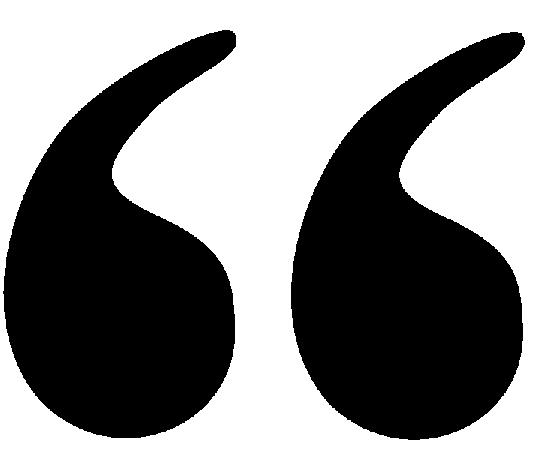

If you’re graduating next year and have any comments, concerns or queries about the issues raised in this article, please feel free to get in contact with the Wellbeing Team at SIZ or SU Officers Aaron
Campbell (Welfare, Diversity and Inclusivity) and Serene Shibli-Sexton (Campaigns and Democracy) for help and advice.
"We’re sorry for any misunderstanding regarding the opportunity to take gowns and mortar boards outside the
Festival Area."
Photo: Unsplash
21st September 2022
4
Photo: Unsplash
Challenges in Higher Education for New PM
Ross Gower News Writer
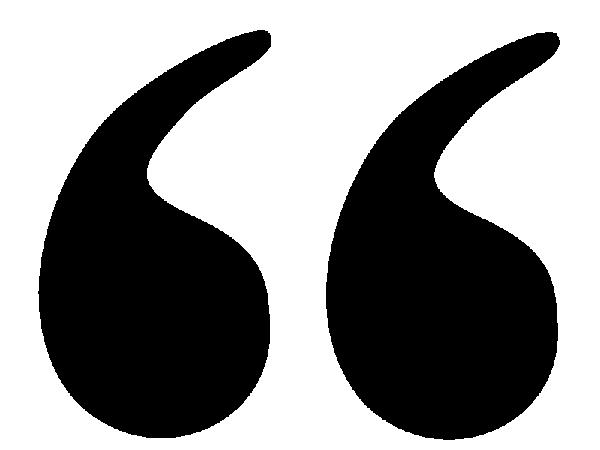
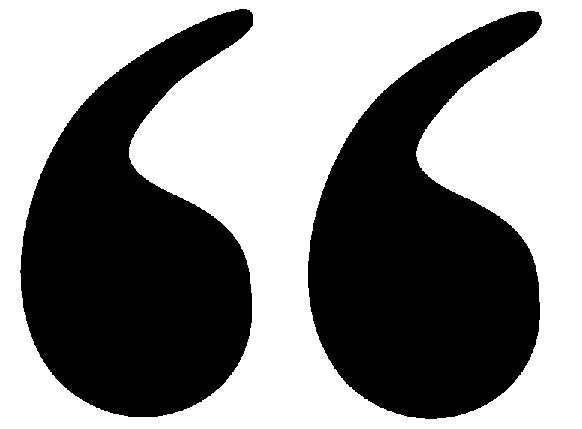
As anticipated, Liz Truss defeated her rival Rishi Sunak with 57% of the eligible vote to become the new Conservative Party leader and Prime Minister earlier this month. The new PM immediately has her work cut out, with the country facing multiple crises and challenges. The higher education sector is one such area facing difficulties that Truss - and newly appointed Education Secretary, Kit Malthouse - will have to respond to in the coming weeks and months.
Since 2018, the UK has experienced a series of strikes on campuses across the country organised by the University and College Union (UCU). Originally emerging as a result of a pensions dispute and later over workload and pay, recent strikes have led to the loss of teaching hours across the UK, including at UEA. With no resolution yet found, Truss’s Government will have to respond quickly to avoid future strike action.
While the strikes were happening and causing loss of teaching hours for many, administrative and bureaucratic issues around Brexit have been also causing disruption for researchers. The hot-button political issue has caused difficulties with the UK’s participation in joint research programmes with EU countries, including the €95.5 billion
Horizon Europe programme. The UK had originally agreed to join the scientific research initiative, but there has since been a deadlock, with the European Commission blocking the UK’s participation over the ongoing Northern Ireland protocol dispute.
In order to protect confidence in UK science and its ability to attract and keep research talent, Truss will need to break this deadlock.
While the new Government hasn’t yet set its overall higher education agenda, we can look at recent comments from Truss to get an idea of what future policy may look like.

Prime Minister. Such changes may affect any planned future UCU strikes and possibly prevent industrial action by some branches.
Due to the planned policy likely affecting the studies of UEA students, Concrete approached both the UEA Labour and Conservative Societies to ask for their thoughts on the prospective reforms. Acting President of the Labour society, Nathan Wyatt, was critical of the proposed forms, arguing “the Conservative Government’s plans would be the largest attack on trade unions in thirty years” and adding, “Liz Truss appears to be hell-bent on shrinking the rights of British workers”. We received no response from the Conservative society.
It seems likely that Truss will tackle the industrial action on campuses by taking a hardline approach against the UCU rather than making concessions.
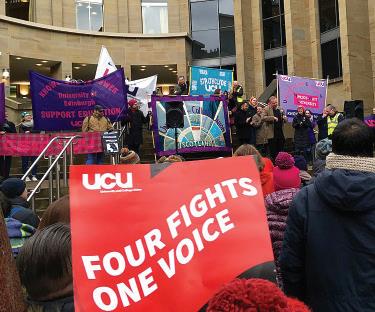
Truss made clear throughout the Conservative leadership campaign that she wished to make it “more difficult” for Unions to strike - pledging to make reforms such as raising the voting threshold for strike action within her first month as
Ultimately, it will be difficult for Truss to resolve both the deadlock over Horizon Europe and for the unions to accept any proposed changes to voting thresholds. Since Truss is a vocal opponent of the unilateral changes to the NI protocol demanded by Brussels on the former, the deadlock cannot be resolved until either side shifts their policy, which seems unlikely to happen anytime soon - putting UK universities’ reputations as an attractive place to invest in and conduct research at risk.
Britain on the Brink: Your Bills and Finances
Freddie Sofar News Writer
For some time, COVID and the restrictions that came with it were thought to be the main threat to university students' livelihoods.
However, since the easing of restrictions, the cost-of-living crisis has become the main largely uncontrollable obstacle in the way of students.
Finance has always been a contented issue for the group with many going without jobs during their studies and even those that do often struggle to provide adequate funds to live on. Most household energy bills are set to increase further by an average of 20% in October. Such an increase will affect the majority of citizens across the country, who are already struggling with the current inflation rate of 10.1%.
The effect of the cost-of-living crisis is already particularly evident amongst students, with the NUS highlighting the number of students using food banks doubled between January and July.
With increasing prices and a lack of financial aid, many students may be feeling anxious about their finances - potentially worsening an already serious mental health trend amongst students.

In a recent Vice article on the costof-living crisis’ effect on students,
first-year law student, Niall Hignett of Durham University said he had to work “upwards of 30 hours a week on top of his studies, to support himself as an estranged student”.
Furthermore, Hignett says that dealing with the financial problems will be “difficult, if not impossible”, adding, “It’s very apparent my paid workload and my degree workload are unsustainable.”
The increased strain on finances won’t just hit current students, but also the prospects of future students. Many young people may be dissuaded from making the decision to start university,
Over recent decades, university has become more accessible. However, with the drastic increase in the cost of living, universities could well revert to becoming a place for a select few if adequate support is not provided soon. UEA SU Welfare, community and diversity officer, Aaron Campbell comments, "My biggest concern is that more students will not have enough money for a reasonable standard of living due to maintenance loan increases not being in line with the rate of inflation. This will result in a lot of physical, mental and emotional strain for students as many will need to find additional work to support themselves, leaving less time for studying, extracurricular activities and taking care of their wellbeing. For any students who need support whether it be financial, emotional or other you can reach out to me, the SU Advice Team and Student Services."
There will also be additional support for students coming to Union House over the next few months.
with the prospect of committing to soaring costs in such times not an attractive or realistic one for many.
If you or anyone you know is struggling with any of the above please do get in contact with the services available to you.
"Truss will need to break this deadlock.
Photo: Wikimedia Commons
Photo: Unsplash
"Truss will need to break this deadlock.
Photo: Unsplash
21st September 2022 concrete-online.co.uk/news/ | @ConcreteUEA 5
Home of tHe wonderful
Finding Your Way: Navigating Change in Your First Year
As with any pivotal change that occurs in one’s life, moving to university is no exception to the challenges and general tumult that you face; the upheaval of your life from home to an oftentimes overwhelming and alienating place can be emotionally draining, at the very least. You leave established relationships behind for a new cohort of strangers and you get introduced to a system of education that feels nothing like school.
This will apply to many of you that join the University of East Anglia this month, bringing your excitement, nerves and other emotions with the seemingly
UEA Welcome Fest: What’s On?
Libby Hargreaves Editor-in-Chief
Welcome week is a time of high emotion; you’ve just left home, probably don’t know anyone and there are all these events to go to!
Which ones are actually worth it? You may have already been to the Welcome Party on Sunday, which is a great chance to meet people from your accommodation block, rep your halls’ colour and experience your first uni night out. The most authentic taste of a UEA club night, however, will definitely be found at Damn Good. Every Tuesday in term time a new theme enters the LCR- the first of which being ‘Jurassic parkty’. Whether you dress up or not (and believe me, most do) you are sure to meet some interesting characters and have a laugh.
Throughout the year you can expect other themes to include the likes of ABBA, Noughties and Disney.
If you’d prefer to spend your evenings sipping a cup of tea and watching GBBO, there is still plenty for you! Do Something Different events are uniquely engaging, and often free! On Wednesday 21st there is an upcycled stationary session which promises a chill afternoon of crafting. Another promising free event will take place in the Hive on Thursday 22nd; the Arcade Gaming Zone will provide games such as a dance machine, air hockey table and much more!
Perhaps the only must-do event for incoming students is the societies fair, an event with lots of freebies and information on
endless amount of luggage that follows you to the Fine City. Heed my advice when I tell you… you will be okay. You are not alone, and with the hundreds of others filing through the Congregation Hall to pick up your keys, you will all band together, make friends through your courses and societies and face the challenges ahead with each other.
As you begin your academic journey at UEA, always remember that the Student Union is your friend. Much like a industry union, the UEASU is established in the heart of our campus to represent your needs to the University. The list of services the SU offers is far longer than this page, but generally if you have any queries regarding anything about student life, go to the SU. It isn’t all advocacy and the hard stuff, though. The SU has its own student bar, convenience store and live music venue, all for the enjoyment of UEA students.
It goes without saying that you are here for the university. But it’s highly important that you get to know the surrounding city as well. When you look in the right places, Norwich can be the gift that keeps
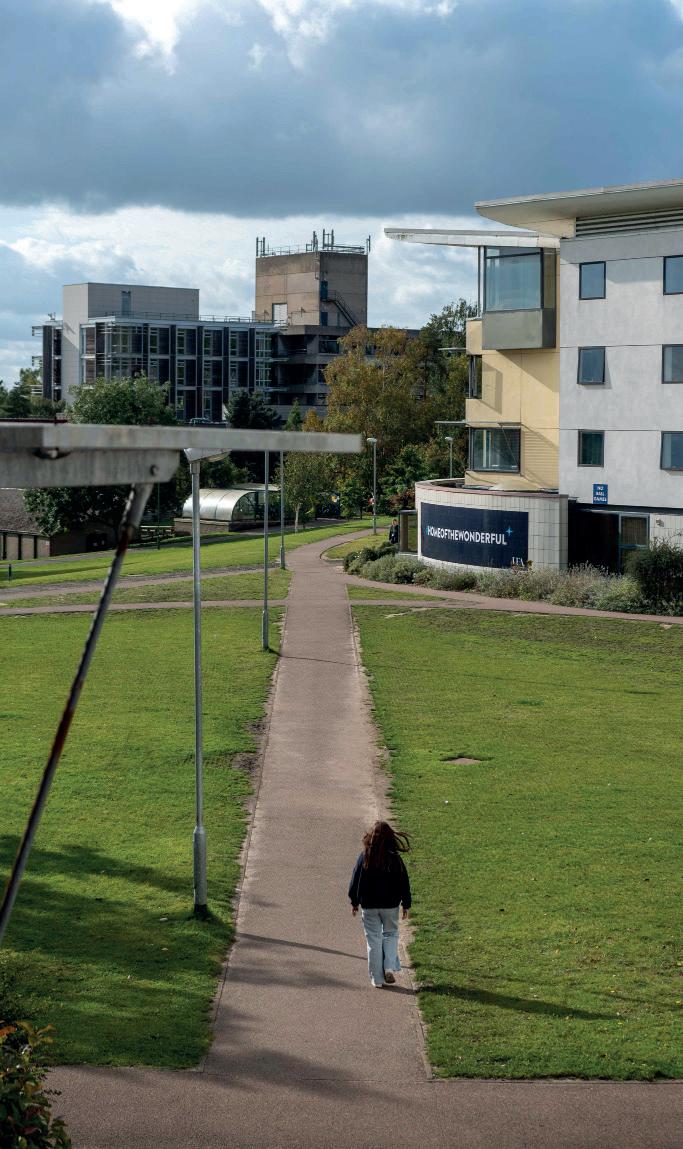
giving and your perfect student home. Its rich cultural history is unmatched, and the community feel has you seeing friends everywhere you go.
I could ramble on all day with advice that’ll benefit you when you join the University but admittedly, I would need several times. The next best thing, however, would be to read Concrete!
There is perhaps no better way to familiarise yourself with your new environment then news curated for none other than the UEA community… and live as much of your new life as you can. It won’t be a cure-all, but it will definitely make the changes in your life a bit easier.
UEAdmissions: Student Stories
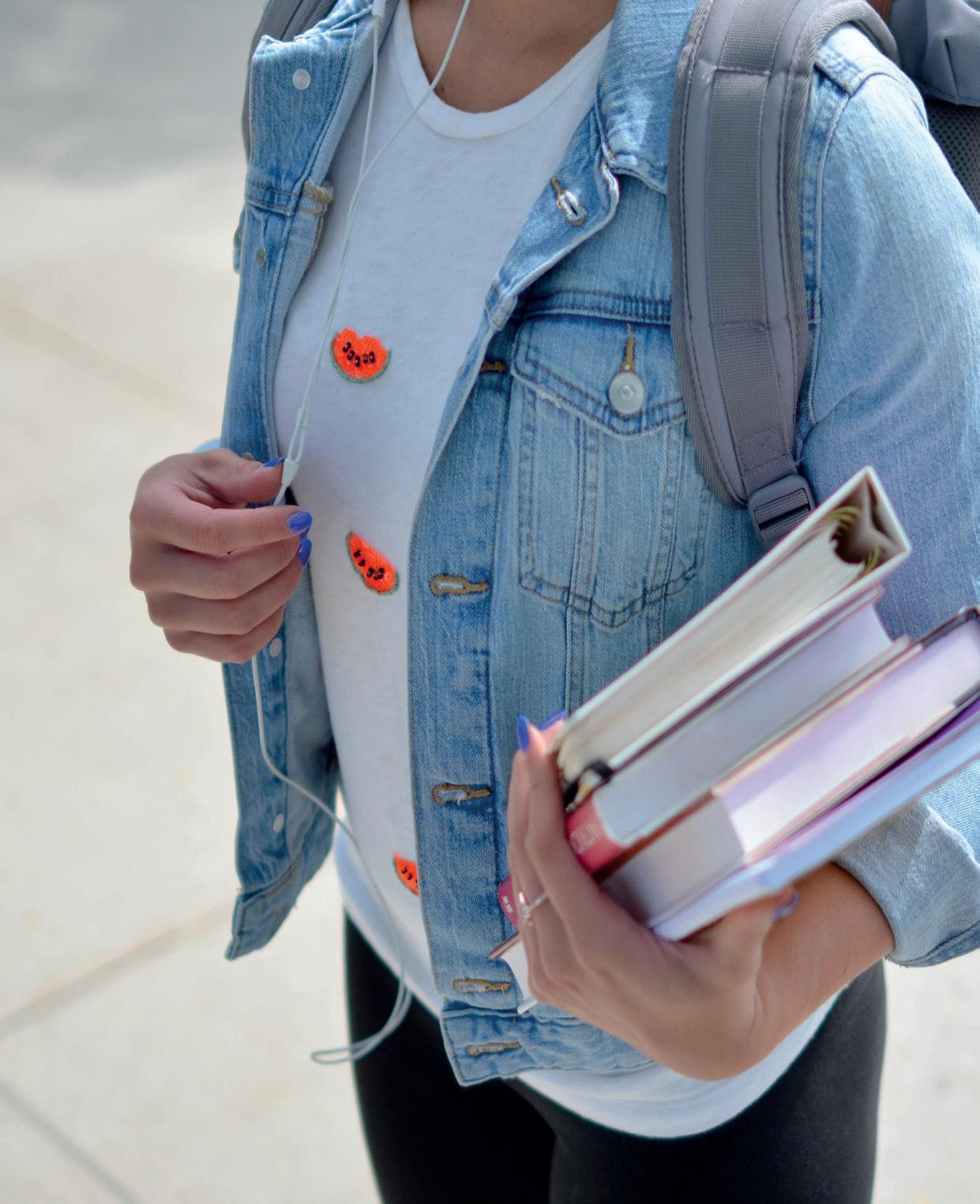 Ronaldo Martins Home of the Wonderful Editor
Ronaldo Martins Home of the Wonderful Editor Leo Henry Home of the Wonderful Writer
Ronaldo Martins Home of the Wonderful Editor
Ronaldo Martins Home of the Wonderful Editor Leo Henry Home of the Wonderful Writer
a range of societies for you to enjoy. Anything from Politics to Taylor Swift, Games to Concrete (us!) will be there to tell you why you should join their society (and bribe you with goodies). If there’s anything you go to, let it be this event- you’ll make your best friends at societies you share an interest in.
I for one am very excited for my next recommendation; disco golf. What does it mean? Honestly, who knows? But it sounds like fun! There are several slots available throughout the evening of Wednesday 21st.
Finally, the famous welcome ball. Circa Waves will be performing, if you can catch them in-between funfair rides like dodgems and the cage (not recommended immediately after a burger or crepe). There will also be the ever-popular silent disco, so you can laugh at your flatmate’s terrible sing-along to Celine Dion.
If you’re a little tired from the week’s many festivities, maybe give this one a miss though- it can be a little overwhelming with lots of sound and light, and it’s much better to recharge and take care of yourself, especially in your first week of uni!
It may also surprise you to find specific meet-ups to cater to your lifestyle or background. Whether you’re a parent, mature student, your friends are your family or you’re the first in your family to go to uni, there’s an event for you!
From ‘Meet and Eat’ to ‘Stay and Play’, these are the perfect events to find your forever friends.
Clearing is a word that can unnerve even the most academically adept of people looking to go into higher education. It is perceived by many as unpredictable, disappointing and a half-baked compromise for students who were not able to fulfil their wishes

of another university. It is nearly never discussed about among student cohorts, resulting in the topic being shrouded by an intangible stigma.
The subject of clearing should not be a taboo. For students who were not privy to the privilege and opportunities that allow one to enrol in university
through a traditional method, the clearing process can be a lifeline and a way to ensure that people from all walks of life are able to join higher education. In a survey, Concrete collected responses from UEA students who joined through clearing or other non-traditional means. Read below to discover their stories.
UEA was my backup choice when I got my A Levels in 2019. Due to a combination of factors including the coronavirus pandemic and an undiagnosed disability, my first choice turned out to be a bit of a dumpster fire, so I dropped out after a year and a half and reapplied to UEA in
Amelie Lomas Home of the Wonderful Writer
“In September last year, I called up the UCAS clearing service in order to find a place. Prior to this, I had made no preparations to go to university and did not even have a UCAS account. I called Clearing up on results day and after telling them my A Level results, I was admitted to UEA within a week. Now it’s a year later, and I have to continue my Engineering degree after deciding to take a gap year to save up by working full-time, as well as partaking in some online courses.”
Charlotte Debono Home of the Wonderful Writer
“In September last year, I called up the UCAS clearing service in order to find a place. Prior to this, I had made no preparations to go to university and did not even have a UCAS account. I called Clearing up on results day and after telling them my A Level results, I was admitted to UEA within a week. Now it’s a year later, and I have to continue my Engineering degree after deciding to take a gap year to save up by working full-time, as well as partaking in some online courses.”
the spring of 2021. It took a lot of wrangling with Student Finance to get them to go along with it. But I’m here now and very happy.
I will be going into my second year studying PPE, living off-campus.
Photo: Concrete- Samuel Baxter
Photo: Unsplash
21st September 20226
In Conversation: Building a Sustainable Marketplace with Thomas Panton
Ronaldo Martins Home of the Wonderful Editor
In the face of an ever-changing world, we are seeing a seismic shift in what sparks interest among consumers as a result of the growing importance of transparency and sustainability.
The challenges posed by the growing climate crisis has spurred on a growing movement for innovation among budding entrepreneurs seeking to find new ways of minimising environmental impact that do not detract from our current quality of life.

One such entrepreneur is Thomas Panton, a UEA alumnus who recognised a need to sequester the issue of environmental waste at the source, by creating Greenr.
This unique platform will operate as a consumer marketplace with a difference; customers will be able to enjoy complete transparency of the provenance and creation of a product, including its ecological impact. Greenr is due to launch this October following a rebrand, and it
is looking to become the mainstream option by targeting consumer’s desires for consciousness around buying sustainably.
I had the pleasure of interviewing Thomas about the identity of the brand, as well as its history and future. We began by discussing what Greenr’s identity to the first-time shopper.
His aim is to build trust among consumers by creating a marketplace geared for sustainable living, underpinned by the values of accessibility, transparency and relatability. There is an emphasis on the detailed analysis of the impact of any products marketed on the website on the environment, and
how it compares to traditionally mainstream counterparts being marketed on platforms such as Amazon. With every product that is sold on the platform, you can see the carbon emissions, water and plastic waste levels, making it a “learning experience” as much as an online marketplace.
From its creation, Thomas and his co-founders has been driven to establish Greenr as a mainstream, instead of fitting itself into the “ecowarrior” niche. By moving away from this, he explains that the customer isn’t demonised by using a service that is convenient such as Amazon, while taking a different approach that challenges and, in a way, calls out the failings with sustainability from the “big-boy polluters”.



This dedication to transparency while still promoting the interests of mainstream consumers finds itself to be beneficial to the company, and instrumental to building brand loyalty.
The UEA has had an important part to play in Greenr’s journey thus
far, Thomas explained to me. The intrinsic passion for development studies found at the University is reflected in the passion of the team at the Enterprise Centre, who have advised the team at Greenr from its infancy and have fostered its development thus far.
The University has also pledged financial support to Greenr, with two initial grants followed by a further £50,000 to take the company off the ground. The University also played an important part in Thomas’ own journey as an entrepreneur.
As a former politics student, he explained his degree course developed his “need to fix problems”
and from there, has worked with groups such as Greenpeace as well as his own previous ventures, that focused on environmentalism.
Since its conception, Greenr has
garnered much support from several companies and institutes and are currently in their crowdfunding stage. The marketplace is due to go live this autumn, following a rebrand. More information and opportunities to invest are available on their website, greenr.co.uk.
“you can see the carbon emissions, water and plastic waste levels”
calls out the fallings with sustainability from the ‘big-
“UEA has had an important part to play in Greenr’s journey”
Photo: Unsplash
721st September 2022
Who are your 2022/23UEA Student Union Officers?
Matthew Stothard Deputy Editor
Evie Drennan (she/her) Activities & Opportunities
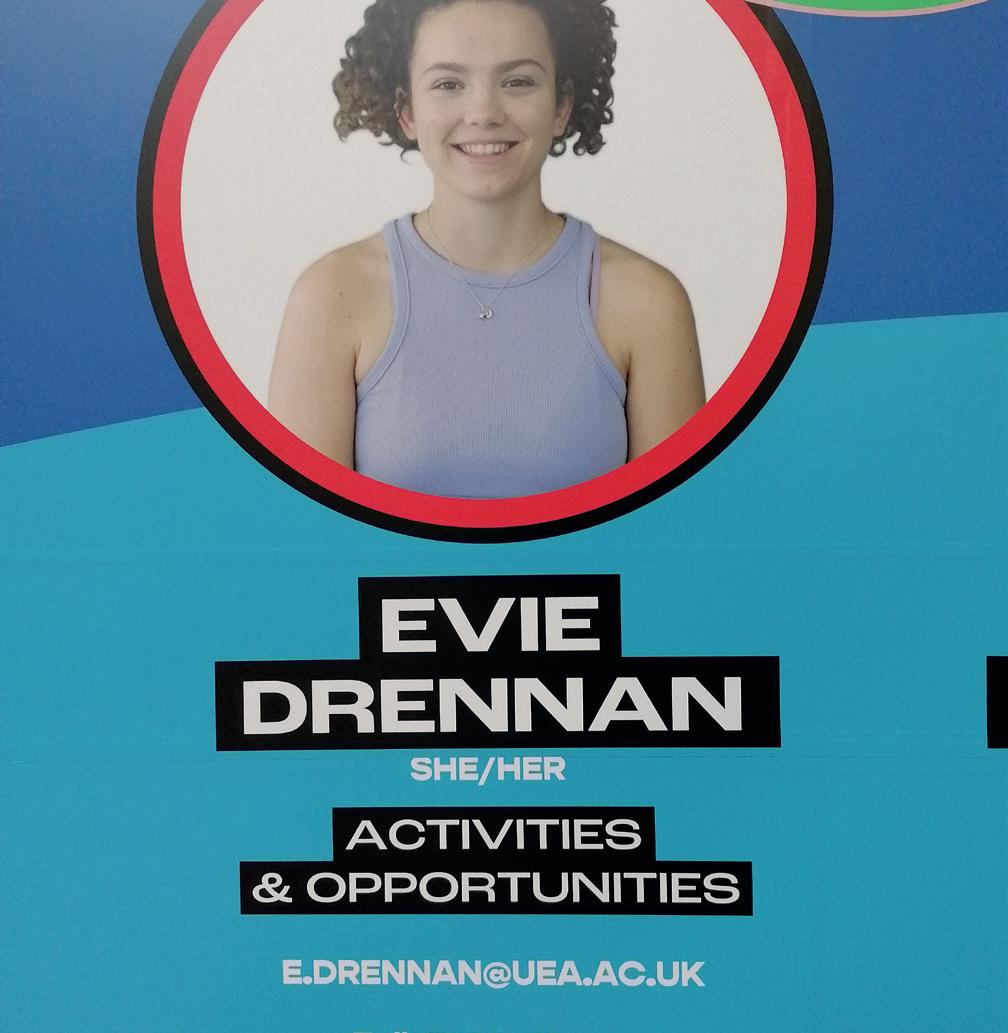
The Activities and Opportunities Officer role is focussed around the SU’s clubs, societies and events. Evie is experienced in this area, having been the First Year Rep, Women’s Captain and President of UEA Water Polo. She also drafted a message for UEA Sports presidents to send to Norwich nightclubs regarding spiking. She hopes to create a nomination service to celebrate students who deserve recognition, set up a drop-in session to support society presidents, ensure that smaller clubs’ voices are heard within UEA Sport and encourage community support of sporting fixtures.
Aaron Campbell (he/they) Welfare, Community & Diversity

Aaron will be familiar to returning UEA students as he enters his second term as Welfare, Community and Diversity Officer, a role which covers wellbeing, diversity and representation. This year, he hopes to continue providing a wide range of events for a diverse range of people, including the popular LGBTQ+ club night Spectrum, as well as continuing to develop accessibility and safety on campus. Aaron is also responsible for concerns around living costs and accommodation, and as such he will focus on ensuring students are supported during the cost-of-living crisis, such as by lobbying the university and council to keep costs of essential products down.
Taylor Sounes (she/her) Undergraduate Education

Taylor’s role is to represent undergraduates’ interests to the university on educational and academic issues. She wants to lobby the university to invest in some of its administrative services, which are largely provided by the Student Information Zone and LTS. She wishes to improve the student rep system, an area she has experience in, having been ECO School Convenor last year, and course rep previously. She wishes to take one of the policies from ECO, introducing a cap on the weighting of group work in modules, and encourage the university to apply it to all schools. She also wants more clarity on which modules have blended learning prior to module selection, and greater pronoun visibility.
Elise Page (they/them) Postgraduate Officer
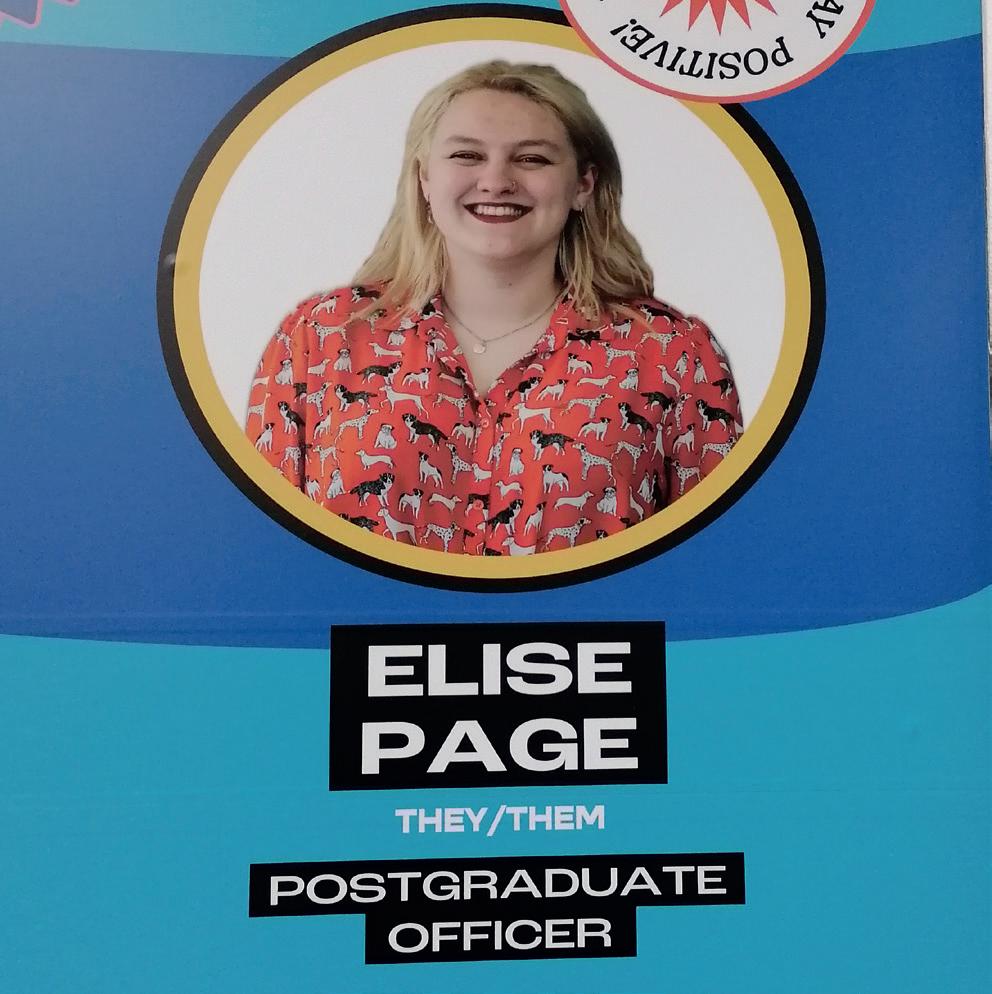
Serene’s role will largely focus on student involvement with campaigns and the SU’s democracy, something they are wellprepared for, having been involved in multiple aspects of the SU’s democracy over the last few years, including the Democracy Review which they hope to bring to completion. They hope to widen participation in campaigning and bring back regular officer updates to improve communication. In their manifesto, they also highlighted a range of campaigns they wished to work on developing –mental health, renters’ rights, ‘Never-Okay’, decolonisation and sustainability. They also have responsibility for the SU’s commercial ventures, like the LCR.

Elise holds a similar brief to Taylor, representing PGR and PGT students on academic issues. They are currently taking a year out from their PhD in American Studies, alongside which they work as an associate tutor in the Interdisciplinary Institute for the Humanities. They completed their undergraduate degree at Oxford before moving to UEA for their MA. This year, Elise hopes to protect the spaces on campus that are designated for postgraduate and mature students, ensure clear financial information is available to postgraduates and support the University and Colleges Union.
Part-Time Officers
There are also Part-Time Officers who take on their roles alongside their degree. They are:
Nathan Wyatt- Non-Portfolio
Sophie Ciurlik Rittenbaum- Environmental
Liz Bigalke- International (EU)
Miriam Hussein– International (Non-EU)
Alice Goldsney - Women’s+
Holly Summers- Students with Disabilities
Georgia Hubbard- Invisible Disabilities
Ameer Al-Magidi- People of Colour
Brandon Thomas- LGBTQ+ (Open Place)
Eight part-time roles are still available in the upcoming SU byelections. More details are available on the SU website.
Serene Shibli Sexton (she/they)Campaigns & Democracy
21st September 20228
Photos (all): Concrete
What’s on?
Week commencing 19th September 2022
NORCON - Norfolk’s TV, Fim, and Comic Con - A Chance to let out your inner geek during a weekend of celebrity appearances, exhibitions and photo ops. On at the Norfolk Showground on Saturday 24th and Sunday 25th September. Tickets available from £15.

Norwich Ghost Walks - explore Norwich’s spooky side around Elm Hill, River Wensum and more! Visit ghostwalksnorwich.co.uk to find out more. Available every Tuesday, Wednesday and Thursday until December. Tickets available from £9.
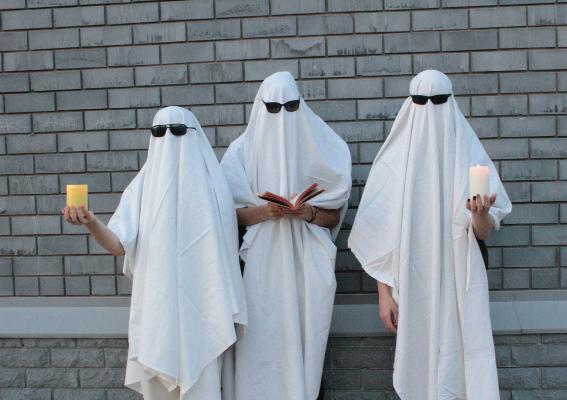
Visions of Ancient Egypt - The Sainsbury Centre’s newest exhibition exploring ancient Egypt as well as our perception of Ancient Egyptian Culture. As seen on page 5 in Venue. Available to explore until Sunday 1st January. Tickets available from £12.
Welcome Ball - UEA’s very own festival - with everything from music and bars to fun fair rides and face paint. At UEA LCR on Friday 23rd September. Tickets at £29.50.
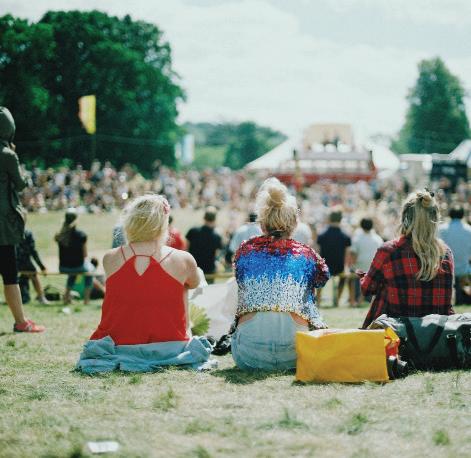
Week commencing 26th September 2022
An Evening with Graham Norton - live in conversation about his books and his career, with a Q&A opportunity. At the Norwich Theatre Royal on Tuesday 27th September at 19:30
Am I Invisible Yet? - A one-man show starring Dunstan Bruce as he goes on a journey of anger and angst. Pay what you can afford on Wednesday 28th September at Norwich Arts Centre.
Writing Queer Texts for Performance - An interactive course where participants will learn the tools to help them find their own voices. Led by queer writer James McDermott from Sunday 2nd October. Pay what you can afford at Norwich Arts Centre.

Public Service Broadcasting - Creators of album Bright Magic are touring around the UK, making a stop in Norwich. At UEAs LCR on Sunday 2nd October. Tickets from £32.50.
Norwich Vintage Kilo Sale - Rummage through racks vintage clothing from the 1960s-90s, including some branded classics. Turn up at St. Andrews Hall between 10am and 4pm on Sunday 2nd October.
Week commencing 3rd October 2022
Mamma Mia - ABBA comes to Norwich in the incredible stage adaptation of Mamma Mia. Tickets are available from £38.50 with showings from Tuesday 4th - Saturday 22nd October at Norwich Theatre Royal.
The Enemy - The trio hit Norwich in their 2022 reunion tour, allowing their fans to see them for the first time since 2016. Taking place in the LCR on Wednesday 5th October. Tickets at £25.
Kamila Shamsie at UEA Live - watch bestselling author introduce her new novel Best of Friends on Wednesday 5th October at 7pm in UEA’s Lecture Theatre 1. Tickets available from £6.
Poetry Unbound - Pádraig Ó Tuama comes to Norwich to read from his latest poetry collection. The event takes place on Thursday 6th October at 7pm at Waterstones. Tickets available at £4.
Student Night at Chantry Place - from 5pm to 8pm, students can enjoy a wide range of discounts in Norwich’s Chantry Place. With a DJ and Photobooth, this shopping spree isn’t one to miss. Thursday 6th October.
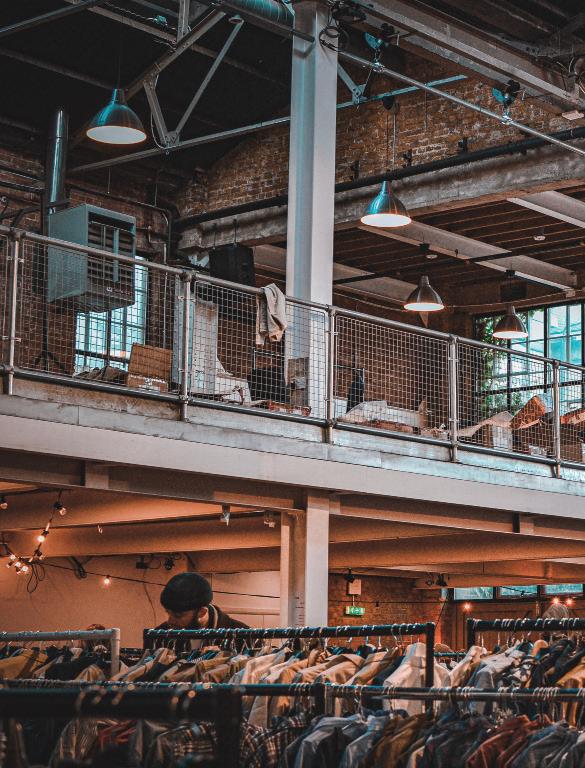
Moth presents MetamorpH - local drag royalty, Moth, brings a whole new level of visuals to drag in their very own show, celebrating total queerness. Find Moth at the Norwich Arts Center on Saturday 8th October at 8pm. Tickets from £9.50.
Week commencing 10th October 2022
Wildpaths - This exciting breed of festival presents the best in live music from indie and hip-hop to new-wave jazz. Exploring some of the best venues of Norwich, and featuring an eclectic blend of artists, this festival spans from Monday 10th October to Saturday 15th October. Head on over to the Wildpaths website for information about ticket prices.
The Pastons Walking Tour - this walking tour divulges the hisotry of the very prominant Paston family. Learn about their family scandal by hearing excerpts from their letters. Friday 14th October at 10am. Tickets from £7.50.
Lawrence Chaney - winner of RuPaul’s Drag Race, Lawrence Chaney is bringing her Halloween tour to Norwich’s The Waterfront. Watch her perform on Friday 14th October. Tickets from £20.
9 21st September 2022
Source: All images from Unsplash
Tips from an International Student:Advice for Freshers Week and beyond
 Leo Henry Global Editor
Leo Henry Global Editor
It’s fair to say that students of every stripe feel nervous about starting university, but international students may feel they face an especially difficult challenge. In this interview, PhD student Hao Mo shares his story of arriving in the UK from China, adjusting to life in Norwich, and his advice for incoming students arriving from overseas.
Could you tell us a little about yourself? How did you find yourself at UEA?
At the moment I’m studying for a PhD in English to Chinese translation studies. My research project looks at how Chinese and English news media cover the stories of social movements. I have been staying in the UK for almost two years. Actually, I applied for five UK universities good for translation research and in the end, I was lucky to have been awarded a full scholarship by UEA.
Was it difficult adjusting to living in another country, especially during Covid-19?
I came here during a very special time when Covid-19 hit the country. Life was very different from what I had imagined. I would say that there were three main challenges at the beginning. First, I had to get used to doing everything in English, from reading to writing, from taking the bus and eating in a restaurant. It took quite a while to get used to using English on every occasion.
The second challenge was food. Chinese food is so different from British food and there were not many choices of authentic Chinese food in Norwich. I was quite homesick in the first few months. Luckily, I had a few Chinese friends who taught me to cook from scratch, so gradually food didn’t make me that homesick anymore.
The third challenge was loneliness - I believe this was experienced by a lot of international students during the pandemic. There were few socializing opportunities on campus and the people I knew were only my flatmates or some of my flatmates’ friends. Luckily more than half a year later, the SU started organizing activities again and I seized most of the opportunities to socialize with others.
What’s your experience been like at UEA both academically and socially, and how does this compare and contrast with

what you experienced prior to arriving in the UK?
I like the high degree of the academic rigour of the UEA. My supervisors often remind me to pay attention to as many details as possible in my research, which of course requires a lot of thinking and literature reading. I feel that in my first year, I read more than what I had read in the previous three years in China. In addition, the degree duration in the UK is shorter than that in China, which means more stress to complete my thesis.
I am surprised by the diversity of the student activities offered by the Student Union! The SU in China acts more as an administrator of student affairs than an organizer caring about students’ mental wellbeing and study. The diversity of the international students’ backgrounds at UEA means more chances to be exposed to different cultures.
there is no such crazy work culture in the UK and British people have way better work-life balance.
Politically, I feel that even though China is called a socialist country, Chinese people are far from being passionate about fighting for their rights such as LGBT rights and workers’ rights. Having lived in the UK for more than two years, I feel social stratification is a serious problem in British society. Politicians are elites who are very rich and powerful, so there’s still a lot to do in terms of achieving real democracy, in my opinion.
What advice would you give to incoming international students?
The first piece of advice would be to try to attend various events or join some societies to make friends. When you start a new life here, you are far away from your parents and close friends and have to start everything from scratch. So, I believe it’s very important to socialize so that you don’t feel very lonely.
Although many people in the UK are familiar with the Chinese Government, few of them (including myself) are familiar with Chinese society and culture – what was life like for you in China, and how does the UK compare?

In China, we have fifty-six ethnic groups, which many people may not know. It means we have a great variety of food and different cultural festivals. Many may assume that Chinese is a particular language, yet in fact, it is composed of a variety of languages. Mandarin is the official language whereas people in my province speak Cantonese and learn Mandarin at school. There are also ethnic groups who speak Russian and Korean.
Academically I feel there’s a very high degree of freedom in the UK. In terms of education, having a debate with the lecturer or classmates is rarely encouraged in class in China but it is highly encouraged in the UK.
Another very significant difference is the work culture. It’s a norm in China to work overtime and even at the weekend. When I worked as a college English teacher in China, I sometimes even had to attend meetings on Saturdays. In contrast,
The second thing is to step out of your comfort zone - this is based on my own experience of making friends. Sometimes it sounds quite intimidating to try to start a conversation with people you’ve never met before. But trust me, it’s worth it in the end. The diversity of international students means that you can become more open-minded when you talk with them and make friends with them.
Finally, since study is a priority in student life, it is very important to make a good study plan, especially for MA students who only have one year of study. Don’t forget to pay attention to your mental wellbeing, too. Sometimes you may feel down for no reason. Sometimes you don’t have any motivation to study. In that case, my advice would be to share your worries with your close friends or seek professional help from the university.
Do you feel like PhD students generally need more support from the university?
I’m happy to see that there were many PGR activities last semester that helped PhD students relieve stress from research and study.
Last semester, a group of PhD students from the School of Politics organized fortnightly seminars where their peers presented their latest research work with a Q&A session. It would be great to receive more support from the university for such academic seminars.
Photo: Unsplash
Photo: Unsplash
10 Global
21st September 2022
Mikhail Gorbachev: A Mixed Legacy
Jon Ely Global Writer
On the 30th of August 2022
Mikhail Sergeyevich Gorbachev passed away. He will be remembered as the great liberaliser of the Soviet Union by some. Alternatively, he will be remembered as the man who killed the great Soviet experiment. Neither view is without merit.
Gorbachev was born in 1931 to a peasant family in what is now the southwest of the Russian Federation. In many ways he represented an ideal of the worker’s and peasant’s state as he came from a poor family to become the leader of the USSR in its entirety. Born during Stalin’s reign as leader he witnessed both the internal violence of the purges and the external brutality of the Nazi invasion of the Soviet Union. These experiences shaped the leader Gorbachev was to become. As a young member of the Communist Party, he eagerly took part in Nikita Khrushchev’s campaign of destalinization in the wake of Stalin’s death.
In 1985 Gorbachev succeeded Konstantin Chernenko as General Secretary of the Communist Party and de facto leader of the Soviet Union. He inherited a state suffering from a prolonged period of economic stagnation while waging a futile war beyond its southern border in
Afghanistan. He entered the role of General Secretary a relatively young man when compared to his aged predecessors: Chernenko, Andropov and Brezhnev. His ascension also signaled a sea change in the Cold War. The height of the Cold War was in the past by 1985 and had given way to a normalisation of relations in the 1970s. However, the rise to power of hard-line anticommunists Margaret Thatcher and Ronald Reagan in the UK and US, respectively, had led to the re-emergence of hostilities between the two sides. Both leaders were strongly antiSoviet in their rhetoric and policies, supporting insurgents fighting against the USSR in Afghanistan, with the plan being to “bleed (the USSR) white” by turning the Soviet-Afghan war into an endless black hole into which precious resources would be poured.
Gorbachev’s successes included ending the Soviet-Afghan war and the social liberalisation of the USSR. He introduced the processes of Glasnost (openness) and Perestroika (restructuring) to try and reform an ailing Soviet Union to secure its future survival. He also endeavoured to end the cold war by collaborating with the NATO powers. He removed many of the authoritarian structures of the state such as censorship of news. However, as the authoritarian structures were removed it became obvious that these structures were the
bedrock upon which the USSR was built and could not survive without them.
With his death Gorbachev leaves behind a complicated legacy. He is remembered in the West as the man who helped to end the Cold War and brought freedom to the oppressive Soviet Union. In the states that emerged from the
breakup of the USSR his legacy is less positive. While the Soviet Union was oppressive it was at least stable. In Russia social liberalisation was followed by economic shock treatment in which state-owned industries were sold off to cronies of Gorbachev’s successor, Boris Yeltsin. While the late Soviet Union suffered from shortages
it was largely unaffected by homelessness or starvation, with it’s destruction the ravages of international capitalism were brought to bear against the post-Soviet states. That is the legacy which survives Mikhail Andreyevich Gorbachev. That and a Pizza Hut advert.
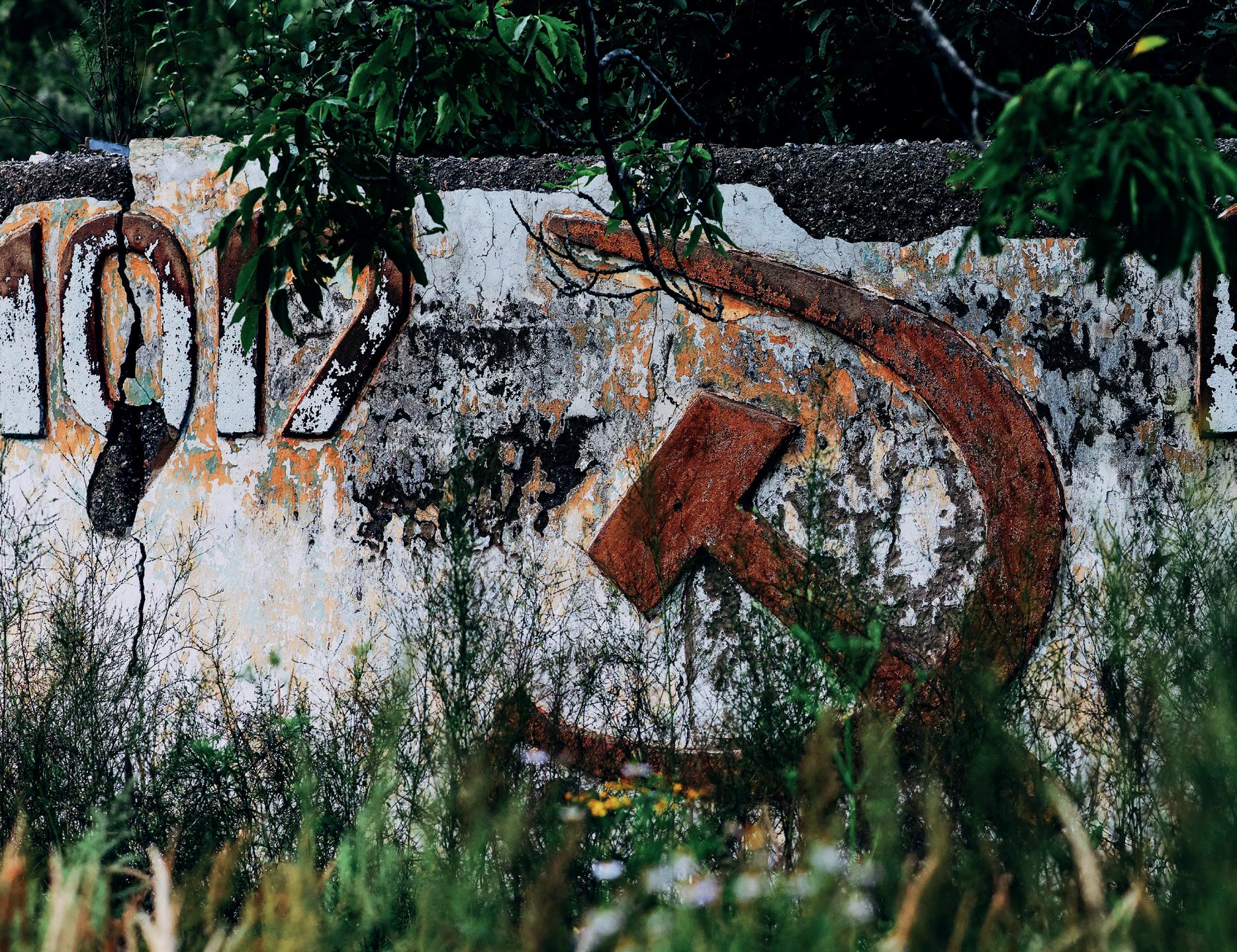
Africa Climate Week: Why the continent with the lowest greenhouse gas emissions has a part to play
Louise Collins Venue Editor
I’m sure you all remember COP26 from November 2021, as well as some of the promises made by governments around the world, such as the £500 million pledge to protect rainforests and create more environmentally friendly jobs in places such as Africa, Latin America and Asia. Since then, regions around the world have taken the initiative to go one step further.
Gabon held Africa Climate Week between August 29th and September 2nd where it became the home to more than 2,300 stakeholders.
The discussion led to ways in which communities, both small and large, could help drive climate action.
It comes as no surprise to hear that Africa is one of the continents most affected by climate change. Since 2020, La Nina, which refers to the cooling of ocean surface temperatures and low rainfall. The phenomenon has been adding more pressure to African resources, which were already lacking. La Nina returns this year, but the affected countries are taking steps to fight back.
Africa may only be responsible for 2-3% of global greenhouse gas emissions, but if we’ve learnt anything over the
past few years, it’s that th world doesn’t always work fairly. Despite China being the biggest perpetrator of greenhouse gas emissions, it’s Africa which is disproportionately affected. More than 70% of the world’s greenhouse gases come from as little as 100 corporations, but are they doing anything to make up for their miastakes? Unlikely!
Instead, it’s left to the most vulnerable to step up. It isn’t going to be the multimillion corporations who suffer from their destruction, it’ll be the small communities around the world who go through droughts and crop failures. Which is why Africa is stepping up. But don’t be
fooled into thinking this is the first of their fight.
Part of ACW’s schedule was to evaluate building towards greener building sectors, which looked back on the Green City Plan from 2017. Cocody, north of Abidjan released the plan with the pledge to reduce carbon emissions 70% by 2030, whilst also creating up to 500,000 new jobs. Some of these jobs involve replanting two million trees, and further developing green spaces. The plan also involved the installation of more solar energy, including traffic lights and lamp posts. This approach inevitable helps reduce emissions and reliance on fossil fuels, whilst aiding its own economic development-
putting more jobs out their by reducing harmful emissions.
About 60% of Uganda’s GDP comes from tis capital city, Kampala. The climate change action strategy completed in 2020, was soon replaced by a new one, born from the increasing risks of a growing city. Here, Kampala acted as a role model for the world, acknowledging that an economically developing country must allow for changes in other aspectssuch as its climate change strategy. These advances were shared at the ACW, a conference which proved that every country, even one as innocent as Africa, can play a part in fixing our ever-growing climate crisis.
Photo: Unsplash
11 concrete-online.co.uk/global/ | @ConcreteUEA
21st September 2022
IntervIew Editor-in-Chief Libby Hargreaves in Professor Sarah Barrow (HUM) and
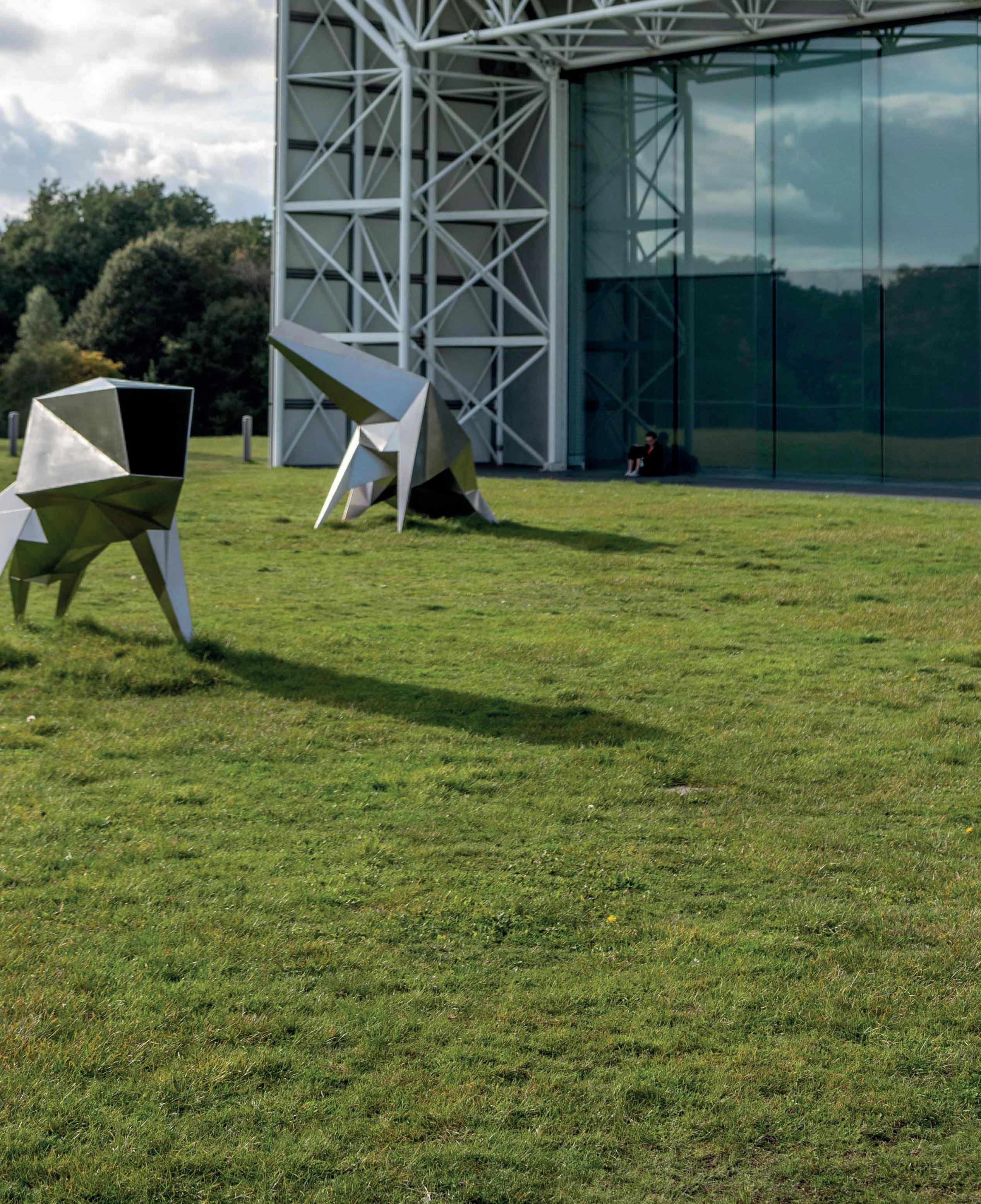
This issue, Concrete is seeking to encourage incoming students and returners alike to make the most of the fabulous staff connections UEA has to offer. Faculty Pro-Vice-Chancellors are no exception, and Sarah was more than happy to pull the veil off the “hidden” work she does as Pro-Vice-Chancellor for HUM.
Her faculty covers four schools; PPL, LDC, AMA and HIS, a perfect fit for her early background in languages, and later film and media- she’s now been her for over five years and has a lot to offer the faculty.
She described to me having “always enjoyed leadership roles”, especially with the desire to “see if we can work closely with students”. She explained to me that she “find[s] ideas of change to be motivating...you have to be accountable and get involved”.
~ ~ ~
“My role is about setting the tone for the faculty” and “to bring value to staff and students”, she tried to do this by “responding to external demands and pressures” (such as reported government tactics to decrease investment in the humanities) as well as internal needs.
One example of this is her work to “collaboratively create a new masters course in medical and health humantities...I remember at the start of the pandemic thinking ‘oh this is awful’ but how can we help, respond and how can arts and humanities play a role in this that’s meaningful?” The course is on track to welcome its first cohort of students next year.
She explained it is equally important “for medical students to find out how they might incorporate a humanities perspective into their work as well”.
I furthered this line of thinking, questioning how we prove our value, as humanities students, in situations like the pandemic: “Through telling the stories of covid, if you’re a historian, looking at previous examples of pandemics and learning the lessons of the past to help influence the present of the future.” “Looking at ways we represent and frame the ways of understanding”.
“One of my jobs is to keep trying to articulate our purpose...what would we be without music, without art, without literature and ways of understanding.”
She described the difference between an “initial fear” and the “longer trauma”, which we’re just now collectively experiencing, and humanities can help heal.
“One of our flagship colleagues on the medical health humanities is the fabulous Christie Watson, she’s a masters graduate and has won numerous awards for her non-fiction and so on and her ways of framing health issues through her writing is really inspirational, not just using writing as a tool but actually framing responses.”
“I think the personal can touch more broadly on a community of people, or a whole nation of people, to bring them together whilst touching them as individuals.”
She stresses that “we shouldn’t be scared to collaborate” and to “see science as just as creative as we are in arts and humanities.” ~ ~ ~
When asked about online learning, she expressed that “we don’t want to lose all...the learning” from pandemic teaching.
“If you can get a good digital lecture going you’re probably going to use some of that pedagogy in your in-person lectures too and you can still improve there”


The HUM goal is to “produce enhanced digital tools in a continuous review”, in conjunction with in-person learning.
~ ~ ~
I asked Prof. Barrow what she’s looking forward to improve upon this year in the faculty, and she kindly explained it has been a “busy year of moving from one building to another” so she wants “to see how that building works for staff and for students”, already it has “a different community vibe...with a student community hub”. She even incentivised students with “providing refreshments, in consideration of the rising cost of living”.
She’s especially excited for the longer-term campus development plan, with the plans for an Arts and Humanities quarter “located down towards the sainsbury centre”. She also reassured me that it “is definitely in mind [for those higher-up], and it is my job to keep it there...there is a big need for a space for arts and culture”. She explains that it’s a key part of her job to be “an internal champion for Arts and Humanities, especially when working together with student voices.”
~ ~ ~
FInally, Sarah’s top tips for incoming students were as soothing as her tone and approach to her role; “don’t rush”, she urges. University is an “exciting time and you;’re in it for three years, dont worry about what happens in week one”.
“Don’t forget we’re here for you, to inspire you around your academic ambitions”, and “use your advisor...they will be your support, your fan, your critical friend”.
Perhaps most profoundly, Sarah thinks you should “learn how to make a decent cup of tea, or make friends with someone who can”.
“What would we be without music, without art, without literature and ways of understanding?”
“Don’t rush.”
“Use your advisor...they will be your support, your fan, your critical friend.”
Image: ConcreteSamuel Baxter
12 21st September 2022
~ ~ ~
conversation with Faculty Pro-Vice-Chancellors
Professor Mark Searcey (SCI)
I also had the pleasure of taking to Mark, who explained his role at UEA and what it looks like day-to-day: “I am the Pro Vice Chancellor for Science and look after the Science Faculty (the seven schools that make up the faculty) on a day to day basis.”
“I work closely with the Heads of School, faculty Associate Deans, the Science Faculty Manager and the Head of Technical Services to make sure that teaching and research are tip top. I have a great team around me and across the Science faculty. I’m also Professor of Medicinal Chemistry and I’ve been at UEA in the School of Pharmacy for 16 years.”
Before UEA, Mark worked in research institutes in Ireland and the United States, mainly on cancer and the development of new drugs. He then returned to academia and worked at the School of Pharmacy in London (now UCL School of Pharmacy).
~
Our recent News investigation found that over 90% of learning is set to be done in-person this year, yet some of the greatest percentages of online learning came from the SCI Faculty (including 16.4% for Pharmacy). In light of this, I asked how the faculty has been affected by the pandemic, and how they are ensuring learning recovers so students are able to be taught to a high standard.
“The pandemic had a massive effect on all of us but particularly had an impact on science degrees, as there is a large amount of laboratory time and that can’t be easily reproduced online. It’s obviously a practical experience. My colleagues did a fantastic job of developing lecture materials, workshops and tutorials for online work but I think it was a relief for all of us to be able to get our students back into the New Science building and teach them the skills that scientists require- whether that was in biology, chemistry, computing science or engineering. We were really lucky that this facility had opened just before the pandemic- it gave us the space to teach in smaller cohorts with adequate distancing.”
“During the pandemic, we got our research students and post-doctoral scientists back into the research labs very quickly- albeit working in shifts of small groups- to try and lessen the impact on their research degrees as much as we could. That was largely down to both the faculty and technical support doing a superb job.”
A post-pandemic world opens up new beginnings for the SCI faculty and beyond: “We’ve been blessed with the New Science building for new teaching laboratories and the ongoing campus development plans (the CDP) will ultimately give us new research laboratories, so things are moving in the right direction from the challenging point of view of physical space.” He still has big plans, “With my Associate Dean for teaching, Simon Lancaster, I am trying to move us towards more efficient use of teaching resources across the Faculty, so that we free up academics time to support their undergraduate and postgraduate students even more and also have time to do research. Time is our most precious commodity and as Science degrees tend to be very contact intensive, we need to build the strong relationship between our students and staff so that everyone feels supported.”
~
Mark also gushed about his faculty, saying the best part of both UEA and SCI is the excellent teaching and research. “The dual intensive nature of our kind of university...I love that.”
“I really enjoy teaching- I don’t do enough of it anymore- particularly the small group tutorials where you can take individual students through chemistry problems and see the light of clarity begin in their eyes. Also, frankly, I like the performative element of lectures! I think even before the pandemic, my colleagues in biological sciences, chemistry, pharmacy and across the faculty were developing exceptional online resources for students and this has only been accelerated by the pandemic. I also love research- I still have a research group of talented post-docs and PG students- and the outcome of
the recent Research Excellence Framework, where we came 20th in the UK, beating a few Russell group unis, should be shouted from the rooftops. I think a lot of UG students choose UEA because they are excited by the research here and can see what exceptional talents in both teaching and research my colleagues are.”

~
Finally, Mark kindly shared some wise words for incoming students. His top tip is engagement: “You know, the key factor is engagement. One of the things you realise early on as a student is that it is now up to you- nobody is going to make you go to that 9 am lecture!”
“There is a very strong correlation between attendance and engagement and doing well on a degree course. Its not all about work...you need to party and have fun, but striking the right balance, knowing when to complete that assignment rather than head out with your friends on other courses is really important.”

My favourite take-away from this interview is a welcoming message to all, that it is “also really important [to realise] that you are not alone.” He continued, “It may be your first time away from home, but there will always be somebody there for you- from your friends to your advisor, other faculty members or our fabulous student support services or the student union. Nobody will judge you if you have a problem, if you are feeling lonely or if you are struggling, so never feel like you cannot reach out. You can even knock on my door!”

“The best part of both UEA and SCI is the excellent teaching and research.”
“The dual intensive nature of our kind of university...I love that.”
“You are not alone.”
“Nobody will judge you if you have a problem, if you are feeling lonely or if you are struggling, so never feel like you cannot reach out. You can even knock on my door!”
21st September 2022 13 concrete-online.co.uk/category/features/ | @ConcreteUEA
Image: Concrete- Matthew Strothard
~ ~
~ ~ ~
~ ~
~ ~
~ ~ ~
Features The art of vulnerability in content creation, with Brooke Le Breton:
“The best stuff comes from what makes you uncomfortable.”
Sienna Norris Features Editor
The Whispering Woman, Brooke Le Breton, is an English Literature graduate here at UEA, with over 4,000 followers on her Instagram account. The 22-yearold has cultivated a dedicated audience for her content; from sex and body positivity to book reviews and charity shop finds. She also has her own YouTube channel and co-hosts the podcast Banging On. She juggles a lot for a student, as an ‘influencer’, yet she kindly agreed to share with me the highs and lows of having a platform and what it means offer a vulnerable perspective to her followers.
Brooke first started Whispering Woman at the beginning of the pandemic; “I had the account before and had kind of dabbled in doing a few book reviews and things, but I hadn’t really committed to it. Having so much time on my hands in the first lockdown, was when I really thought ‘okay I’m going to run with it.’ So many people were spending so much time on their phones, so there was a natural audience there for me, which hadn’t been there before. More people were also reading in lockdown too, so that’s when it properly started.”
sex... I want to talk about topics that people walk on eggshells around, for example, how many people talk about breakups where you know you’re the one in the wrong? That’s interesting to me and people can just relate to that vulnerability.
Personally, before meeting her, I had made an assumption based on the fact she was an ‘influencer’. I’m ashamed to admit I expected to see her page full of ADs from teeth whitening companies or diet pills. What I found was content I’d want to see on my own Instagram feed!
I asked Brooke if she had experienced a lot of preconceptions about her work, and not to my surprise she had, “I don’t really use the word ‘influencer’ because I think it’s a bad description of what I do. Influencer stems from influence and if I want to influence anyone to do anything, it would be to read a good book, think better things about their body or buy a sex toy. I’m not trying to influence them in the way typical influencers are with capitalism and other nasty stuff. When people say, ‘you’re an influencer?’ I’m like ‘yeah but it’s not what you think,’ It’s hard to redirect the assumption in that way”.
When I asked what she’d prefer to be called, she said ‘content creator’ because that’s precisely what she does - she creates content for an audience. She noted that it feels more connected than ‘any old influencer’, and I agree entirely.
“The people I follow are people who I’d want to be friends with” and that’s exactly the feeling you get with Whispering Woman.

and to help other people.”
In a way, I think mine and Brooke’s experiences are similar. I began at Concrete writing about books or films - my degree essentially. As I started building up my confidence with writing, I focused on going more personal and tried to intertwine
instead of following people just because they’re popular. She struck me with this: “My policy with Insta is, if I’m walking down the street and I see you and don’t have the urge to talk to you, why would I follow you on Instagram? Why would I want to be bombarded with daily updates on your life if I don’t feel the need to stop and have a conversation with you?”
Brooke’s account has blossomed rapidly from book reviews to body positive posts; from promoting and advertising sex toys and lingerie. “I was starting to talk more about what I wanted to, I really enjoyed the openness and vulnerability of it all... As I started to change up my content I thought ‘okay this is what I want to write about’, but for me I think I just enjoy writing about things people are scared to talk about and be really frank.” She further explained “The topic that challenged me the most was
I wanted to know how Brooke’s family reacted when she began posting what is seen as more ‘explicit’ content and she told me they were “generally really supportive”, but then with anything online, “there’s the side to putting yourself out there that you can’t take back and will be in a place where everyone can see it.” Brooke assured me “the human side to it is hard, but that’s what draws people in and makes you more relatable. You reap the most reward from doing that for yourself
my experiences with the various sections I was writing for, and it was quite liberating.



I’d read many articles from the newspaper and there were numerous times I remember being drawn to one particular piece because I related to the personal experience – just like with Whispering Woman.
I followed her advice, and it has become much easier scrolling through my feed, not questioning why I’m following a certain person then actively not doing anything about it because of the guilt. I now understand what Brooke meant when she said, “why is reality any different to our online personas? Following people has become a customary and then unfollowing people you don’t actually care enough to see them on your feed is such a relief. It’s like filtering so much noise out of your brain.”
Of course, I’m not suggesting everyone do this, since we live in a time where we tend to rely
Instagram account to focus on finishing her degree, and every time I’ve seen her since I ask when she’s coming back, (I’m a super-fan), and she’s probably sick of that question by now.
Brooke confided in me about how much her life has changed recently, she explained she took the break because she was “putting too much creativity into [her] content, there wouldn’t be any left for [her] dissertation.”
Later on, she told me that around the same time, she’d found out her grandmother had breast cancer, and once she started getting better, her own mother was diagnosed with it. “I’ve had these two monumental events happen to the most important women in my life, and a lot of
As the interview progressed, I was interested in Brooke’s take on how a lot of our relationships are changing with social media in the age of prioritising mental health. She began talking about how a lot of us are adjusting to what we personally want to see on our social media feeds,
on social media for a lot of our needs, but if you’re not liking someone’s posts and following them because you met them at a party four years ago and haven’t spoken to them since, just hit the unfollow button!
During April, Brooke took a break from her Whispering Woman
my views and opinions shifted when I realised that people aren’t going to be here forever. I was pouring so much of myself into Whispering Woman, that it drained me. I started questioning my purpose with the account because I’ve been thinking so much about legacy and what you leave behind amidst what’s
“I enjoy writing about things people are scared to talk about”
Photo: Pixabay
14
21st September 2022
happening with my family. I’m gradually starting to think about coming back, but it got to a point with the account where I felt like I was selling myself and not the content and I didn’t want it to be like that.”
Considering Brooke’s job as a content creator, I thought it was courageous of her to admit this feeling of unfulfillment, as I’m sure a lot of us can relate. Nonetheless, Brooke is planning a comeback with her podcast and said she wouldn’t want to bring back Whispering Woman unless she had a different mindset.
“Being in the age of COVID, of course we are going to experience some sort of identity crisis in our generation, but figuring it out is part of that, which is what I’m doing right now.” We live in a time where people present to us
these online personas which are nothing like reality and those who see them feel less than or unaccomplished, so it’s refreshing to see Brooke say what we’re all thinking.
After over an hour of talking, I asked what was next for her once she finishes her Master’s next year; she’s still figuring it out, aren’t we all? Like most in their early twenties, she’s going with the flow and hoping for the best. And as if I couldn’t love her more, she then told me she had plans after we finished the interview to go and surprise her mother by joining in on having her hair cut off, to show her she wasn’t alone in her journey.
I once again was filled with admiration when she said, “you live once and it’s just hair, it will grow back.”
I came away from the interview knowing that being vulnerable is an art when people are watching/reading, an intention I share in my tenure as
Features Editor. I want people to experience the same utter joy that overcomes me when someone says, “I really liked this article, I feel the same

way.” For that, I want to thank Brooke for taking this time to talk to me and giving me, and hopefully others, a lot to take away from our conversation.
Having laws placed on your body: a woman’s perspective
Jess Blissitt Features Writer
Last January, I went to Philadelphia in the United States for my semester abroad. I made friends with some great girls, girls who stressed over exams, relationship drama, and pregnancy scares, and like most people our age, they were exploring their freedom in every way shape and form - including sex.
That doesn’t mean the risks aren’t taken seriously, because no matter where you are in the world, it seems every woman is made to feel that sex has far bigger consequences than it does for cisgender, heterosexual men. From a young age, girls are taught that casual sex is the equivalent of a penance.
This is what it’s like in America, hence why so many of my friends would try several contraceptives, to stop growing a whole other human at the age of eighteen. Trekking down to the pharmacy each Friday to buy Plan B as a precaution for the weekend ahead became natural to them, especially now.
On the 24th June 2022, the US Supreme Court overturned Roe v. Wade, meaning my American friends will now have to ask permission for the right over their own bodies. Safe abortions have been entirely criminalized, with the reason being that a clump of cells is supposedly more of a life than the female carrying it.
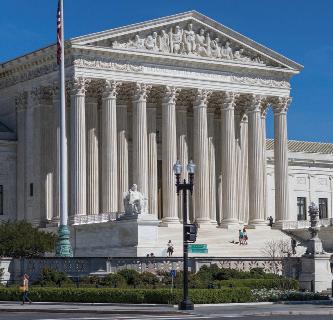
Well, if this is a solution, consider the women who don’t want kids, the women who have been raped, the women that simply just want to have sex, instead of being forced to breed.
Personally, I’ve never liked kids; they’re sticky and loud, and I don’t really wish to have any, even though I’m only twenty years old, I feel it’s such a violation not to be granted the sexual freedom most men get, and I don’t even live in the States!
Forcing women in the U.S. to have a child condones them to a life of maternal responsibility they did not ask for, even if they decide to put that child up for adoption. Having children should be a choice, now it forfeits our right to equal opportunities that men have.
If we are lawfully obligated to raise children, it is not only taking away our freedom but so many more things, what about the men who impregnate these women, what’s their consequence?
How are women meant to see the Supreme Court’s decision as anything but a violation of our human rights?
Naturally when I heard the news, I checked in on my American friends. They replied with their usual candour, but an hour later, I received a call from my friend. She asked how I was, but the truth was neither of us knew what to say to each other. I could hear her crying on the other end of the phone.
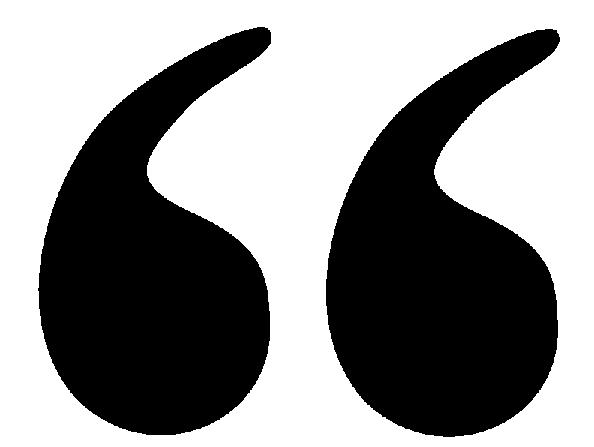
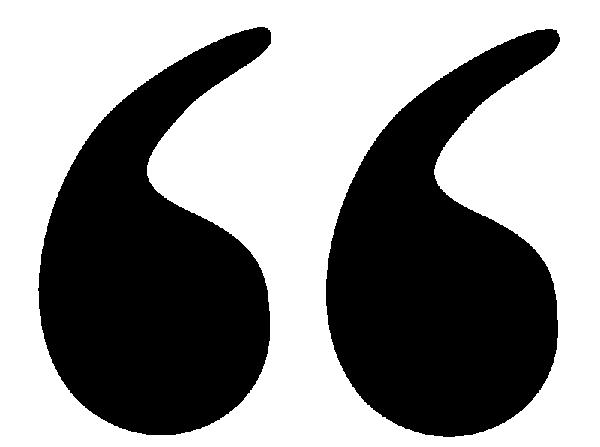
When she hung up, I realised that I was crying too - Big, fat, tears. Despite our given freedom in the UK, there is always the fear of the unknown lurking.
take a pregnancy test as she hadn’t been feeling great since she last had sex.
We laughed about the possibility of her becoming pregnant, but our jokes didn’t go further than the discovery, because we knew she had the right to an abortion at the time, the right to control whether she wanted to raise a child or not.
Despite knowing this, after she peed on the stick, we waited, and her nervousness permeated the room. I knew exactly how she felt because I had peed on the occasional stick myself, despite always using protection during sex.
Even when we had the right to terminate the pregnancy,
in those three minutes until the confirmation, we were overtaken with anxiety, but now, my friends in America might have to live out those fears we had that day.
When a male friend brought up the abortion bans in America over dinner, I politely declined talking about it. For me, and a lot of women, abortion is not a trivial dinner topic, but a fearful omen for the future.
This will always be an important topic, for as long as women are refused safe abortions, pro-lifers shall always expect us to fight back.
The feeling of (metaphorically) having other people’s hands on your body is one that nobody should bear witness to.
No matter what we do when it comes to our bodies, a consequence always looms for women, in the case of wanting to have casual sex, there’s always the risk of an unwanted pregnancy or a sexually transmitted infection and so on.
Earlier this year, a friend of mine in America jokingly suggested that she should
Photo: Unsplash
“There is always the fear of the unknown lurking”
Photo: Pixabay
“Having children should be a choice”
21st September 2022 15 concrete-online.co.uk/category/features/ | @ConcreteUEA
Comment
Is the cost of living crisis having aneffect on which universities freshers are deciding to locate to?
Eve Attwood Comment Editor

As a new wave of UEA freshers enter with their overly packed cars and ongoing questions about what differentiates A List from Damn Good, I’ve found myself feeling nostalgic, remembering how it felt to arrive with the very same nerves. But it also prompted me to think back on the entire process of applying to university. What was it about UEA that confirmed it was the right university for me, and are these the same qualities which freshers today are considering?
After Brexit, the pandemic and the Ukraine invasion, Britain is suffering a cost of living crisis with
no clear end in sight. Rising prices have undoubtedly affected many of our decisions in the months moving forwards, and this affects students no less. The ‘broke student’ stereotype is one often joked about, but it has never been more real.
Students all across the country are struggling financially, relying on part-time jobs or family members to aid them so they can keep afloat whilst studying. Such pressures are arguably having an impact on which universities freshers are choosing to locate to, based on whether they are financially accessible or not.
Statistics from the Natwest Student Living Index highlight the affordability of different university cities. For instance, London-based students’ contributions from parents or family are 88% higher
than the UK average. In comparison, students in Manchester and York were said to spend the most time in part-time work. It is also interesting that some students were more likely to be motivated by the cost of university fees in their choice of university. Cambridge students were the most likely to be motivated by this, whereas students in York, Glasgow and Liverpool were the least likely to consider it.
Low-income students may also be more likely to pick universities which have a reputation for providing sufficient financial support. Around 1 in 4 students reported that their university offered no support to help them in the cost-of-living crisis. In Durham, this was felt by 56% of students, compared to Cambridge (9%) and London (12%). University cities
which have a reputation for being expensive such as London, Brighton and Surrey may also be more likely to be avoided by students wishing to budget, compared to places like

Liverpool, Newcastle or Leeds which are more likely to be viewed as cost efficient due to historical statistics and perspective of the North-South economic gap.
Even before the cost of living crisis surfaced, I too considered
finances when choosing UEA. I had initially been the most interested in a university in London, imagining myself living only a tube ride away from everything the city had to offer. But the more I researched, the more inaccessible London seemed, and the prospect of struggling financially there encouraged me two look elsewhere. I wanted, like every other student, to be able to enjoy university instead of spending each day dreading my bank balance. I felt that at UEA, I would be able to do this and London wasn’t going anywhere – it was only a train ride away. It is undeniable that finances are affecting a number of young peoples’ decisions. Even in the midst of online shopping and the occasional takeaway, students are money-conscious and aware of how their financial decisions impact their families.
PM Truss: The continuation of a cruel economic fantasy
Jamie Bryson Comment Writer
Once again, we have a new Prime Minister. Whether she is an improvement on the extremities of Boris Johnson, I’ll leave it for you to decide. But one thing is already crystal clear: the acceptance of manipulative, dirty profiteering over the most basic welfare needs of the British public is here to stay.
The announcement that UK energy bills will be frozen at the extortionate cap of £2,500 on Monday 8th September came with little surprise. In principle, this move should be welcomed. But dig deeper into the policy, and a clear deception can be uncovered, leaving the UK taxpayer in the red.
To cover the cost of the cap, the government has taken out a £100 billion national loan. This isn’t invisible cash. The loan will be repaid by you and I through our energy bills over the next 10-20 years. Where will this money go? Not to our energy suppliers – most of them are only just breaking even. No, almost all of this money will go directly to the oil companies at the very top of the supply chain.
These are the people profiting from others’ misfortune, with BP’s latest quarterly profits standing at a record $9.3 billion. It is important to understand why these companies are making such extraordinary profits and Liz Truss’ complicity in allowing them to do so. Tragically, one of the biggest contributing

factors in this has been Putin’s invasion of Ukraine.
Over time, Putin has strategically built up Europe’s dependence on Russianstate-controlled oil and gas supplies so that the West will indirectly suffer as conflicts with Ukraine continue. This has been demonstrated recently by Russia cutting off its main European pipeline — NordStream1.
While the UK only relies on 1-2% of Russian-derived oil and gas, the supplies are traded on a global free market, so UK prices are inevitably affected. None of us could predict such a crisis and its knock-on effects.
However, our political and industrial leaders can plan for, and be willing to make, exceptions to the operation of
essential services in times of crisis, regardless of ideology. Exceptions which highlight a clear civil duty in contrast to the often impersonal opportunism of the free market.
Without a doubt, the majority of the $40 billion combined profits of the oil giants should be redirected to cover this bill. All our opposition parties have called for an increased ‘Windfall’ tax on these multinational companies in recognition of this, with Keir Starmer emphasising: “the real choice[...] is who is going to pay. Is [Truss] really telling us that she’s going to leave these vast excess profits on the table and make working people foot the bill for decades to come?” Truss’ response about “attracting investment, keeping taxes low” provides no mention
of the human beings faced with the dire consequences of this crisis.
Such a rhetorical, textbook answer sums up the repugnant preference of trickle-down economics over aiding people in accessing the most basic needs to live a comfortable life. There is a cruel ideological stubbornness that has time again festered and failed under Tory governance.
If there is any integrity or conviction left in the Conservative Party, it needs to stand up, and soon, to a PM who will otherwise get away with anything – just like the last.
“Around 1 in 4 students reported their university offered no support to help them in the cost-ofliving crisis. ”
Photo: Pixabayw
Photo: Wikimedia Commons
Photo: Wikimedia Commons
Photo: Unsplash
21st September 202216
What the strikes say about Britain’s political instability
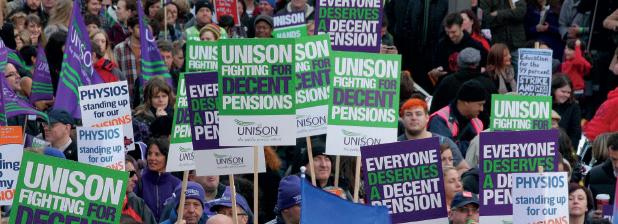 Sienna Norris Comment Writer
Sienna Norris Comment Writer
Over the summer, there have been an unfathomable amount of strikes across the UK, covering a range of vital sectors from rail and postal workers, to doctors and nurses. Most areas of life have failed to avoid the effect inflation has had on this country. These strikes are just a small reflection of the economic crisis taking place in Britain. Not only has inflation affected energy bills and food prices, but it has also limited the chance of pay rises for workers who have been underpaid for far too long.
I’m sure this year has felt surreal for most people, especially these past few weeks, Boris Johnson stepped down as PM, and was swiftly replaced by Liz Truss. Only a few days later, Queen Elizabeth II died. This winter will see many
households unable to afford their energy bills and struggling to survive, adding to the rubble left of ‘Great’ Britain. It’s like something out of a post-apocalyptic movie.
The political unrest of the past
to rolling my eyes whenever a Conservative MP comes on news broadcasts to instil false promises in citizens, but until they actually start offering helpful solutions, the eye rolling will continue.


few months is the most significant since the “Winter of Discontent” in the 1970s (sound familiar?).
The strikes have caused mass disruption across the country, but it all stems down to the government. I’m no stranger
All the workers who held up Britain during the pandemic and the rise of living costs are now having their work thrown back in their faces by those unwilling to listen to their desperate cries for help. I don’t think I’ll ever begin to understand why people that have the money do not offer to help those in need, and a £2,500 price cap on energy bills will not suffice. It is a temporary solution to an endless problem.
Is £2,500 really the best they can do? Our new PM had an estimated net worth of £8 million on top of both an MP and PM’s salary. I’m aware the problem doesn’t just lay solely in Truss, it lies with the entirety of the government
now, they aren’t directly affecting me, but then as a university student, I’m no stranger to the frustration surrounding them. Strikes go all the way back to the industrialisation of Britain in the 19th century, where low pay and poor working conditions were being protested. With the added burden of food and housing costs quickly rising, why shouldn’t people be striking when the only thing that isn’t rising are wages? What other option is there at this point?
Mariam Jallow Comment Writer
Some of us love to work. The feeling of being of use, being productive, and being a contributor is an addictive one. However, when we begin revolving our lives around working excessively, we are faced with a whole new beast. Prioritising work to the point of sabotaging health, well-being, and social life all for the sake of success sounds every bit as exhausting and unhealthy as it is. If that’s the case, then why do so many continue to do it?
This “rise and grind” mentality, or “entrepreneurial” mindset is most recently referred to as “hustle culture”. This isn’t
a new phenomenon, but from viral videos of Kim Kardashian telling us to “get off our asses and work”, to Gary Vaynerchuk’s quotes on Twitter bios, you might have noticed that it’s only been increasing since the pandemic began.
The other day, I watched a TikTok of a university student going about her usual routine. As an entrepreneur she’d work on her business from early morning to mid-afternoon, do hours of assignments and schoolwork, before heading off to her fulltime job in the late evening, fuelled by a one-hour break and five energy drinks. As impressive as it was seeing a fellow fulltime student work so hard to be able to provide for themselves, there’s no denying the very real
I’ve said this before and I’ll say it again: the average MP earns £80,000 a year and the U.K. Government has billions rolling in every year, so where does it all go?
– a government mostly made up of those who have never, and probably will never, choose food over heat.
It’s easy for me to say I agree with the strikes, because as of right
So, next time your train gets cancelled, don’t point your finger at the strikers. Look to the ‘leaders’ of this country, because they’re the only ones with the power (and money) to do anything, and they’re choosing to do the absolute bare minimum. Hustle Culture Hoax
concern and profound anxiety that comes after realising this overworked lifestyle is increasingly becoming the expectation for those in my age bracket. In 2020-21, the Health and Safety Executive (HSE), Britain’s national regulator for workplace health and safety, reported a large increase in the number of people suffering from work-related illness from pre-coronavirus levels. It should come as no surprise that most of these cases (0.8 million) were classified as suffering from work-related stress, depression, or anxiety. Unsafe working conditions, low wages, large workloads, and lack of support are all driving factors behind these statistics, and it would be remiss to not acknowledge the
largely political and economic influences responsible for the state of our current workforce.
Hustle culture on many fronts fails to acknowledge that for many of us, our lack of financial gains have little to do with our work ethic, and more to do with our society rapidly becoming one in which workers are exploited for maximum profit and minimum compensation.
Additional barriers such as ableism, racial, sexual and gender discrimination mean even the hardest of workers, who take up multiple jobs at once, fail to ascend to the image of financial success hustle culture promises. Saying “you’re just not working hard enough”, is largely dismissive and removed from the reality
that your position in life can be influenced by factors outside of your control.
So where is this increased obsession with hustle culture coming from? Personally speaking, my own experiences stemmed from a fear of failure. This fear can take on many different forms. Perhaps it’s a result of perfectionism demanded by your own self, peers, or society, or maybe it’s the fear of not being able to afford the things you want or need in life. The idea of being recognised and compensated for putting in the work is an ideal solution to those fears, one that toxic productivity and hustle culture promises, but unfortunately, fails to provide.
“This winter will see many households unable to afford their energy bill and struggling to survive[...]”
“Why shouldn’t people be striking when the only thing that isn’t rising are wages?”
Photo:
17 concrete-online.co.uk/category/comment/ | @ConcreteUEA
The
21st September 2022
Wikimedia Commons
Travel & lifesT yle
Lifestyle tips for freshers
Survival Essentials
Lily Boag Deputy Venue Editor
Welcome Week is here! Kicking off with celebrations of new beginnings, there is plenty to get involved with. Young, wild, and free, freshers are flooding in excited for their first days at university. So now seems like the perfect time to reflect on all the need-to-know tips to smooth sail your way through first year.
First top tip: stay on top of your bank balance. Welcome to the real world of rent, bills, and council tax. Whether
Friends, clubs and societies
you’ve got a healthy maintenance loan, or your parents are happy to keep you afloat on the financial boat, you don’t want to be stressing about finances because you’ve spent your budget in the clubs on Prince of Wales Road. Don’t be tempted to splash the cash. Save those pennies where you can and remember: a student discount is a student’s best friend.
A new city, a new home, a new room. While you may have longed to escape from your parent’s domain, living under your own roof can be overwhelming and it’s perfectly normal to feel homesick. Familiarising yourself with the campus, your accommodation, and the city will help to make you feel more
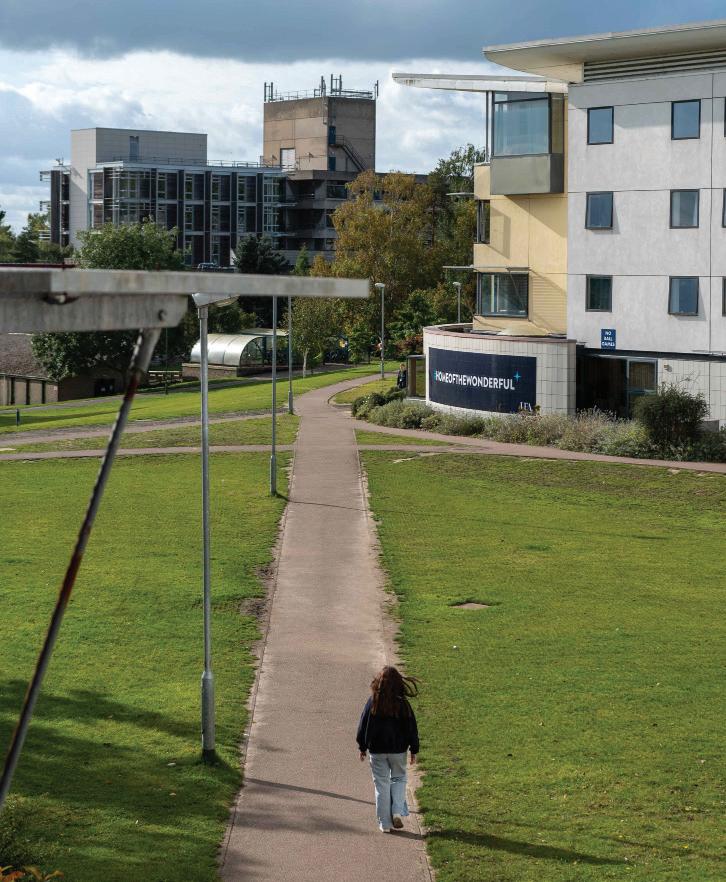
making friends for life. University life is romanticised in almost every aspect, but it isn’t always like in the movies, and that’s okay! I wish I had known that when I was a fresher.
grounded in your surroundings. And while you might end up arguing about the washing up with your housemates, as long as you respect each other’s space and boundaries, you’ll be able to overcome it.
Ever been in an exam hall cursing your
own name when you’re faced with a question on the topic you missed when you were skipping classes at college? Don’t sleep through your lectures. You never know what you’re going to miss, and it could make all the difference in those dire moments.
But of course, always prioritise your mental health. (It’s probably going to go
through the mill over the next few years…)
Most importantly, first year is the time to meet new people and try new things. Confidence is key. Push yourself out of your comfort zone, experience the adventures of university, and thrive in your new life as a student. It’s going to be a wild – but wonderful - ride.
flatmates bond without you, even if they're not being mean about it. But that doesn’t mean you won’t make friends elsewhere.
You hear all of these amazing stories about how university is the best time of a person’s life, that they became best friends with their flat-mates immediately. You go in, not knowing who you’ll be living with, but anticipating
Photo: Unsplash Louise Collins Venue Editor
Finlay Porter Travel & Lifestyle Editor to breathe
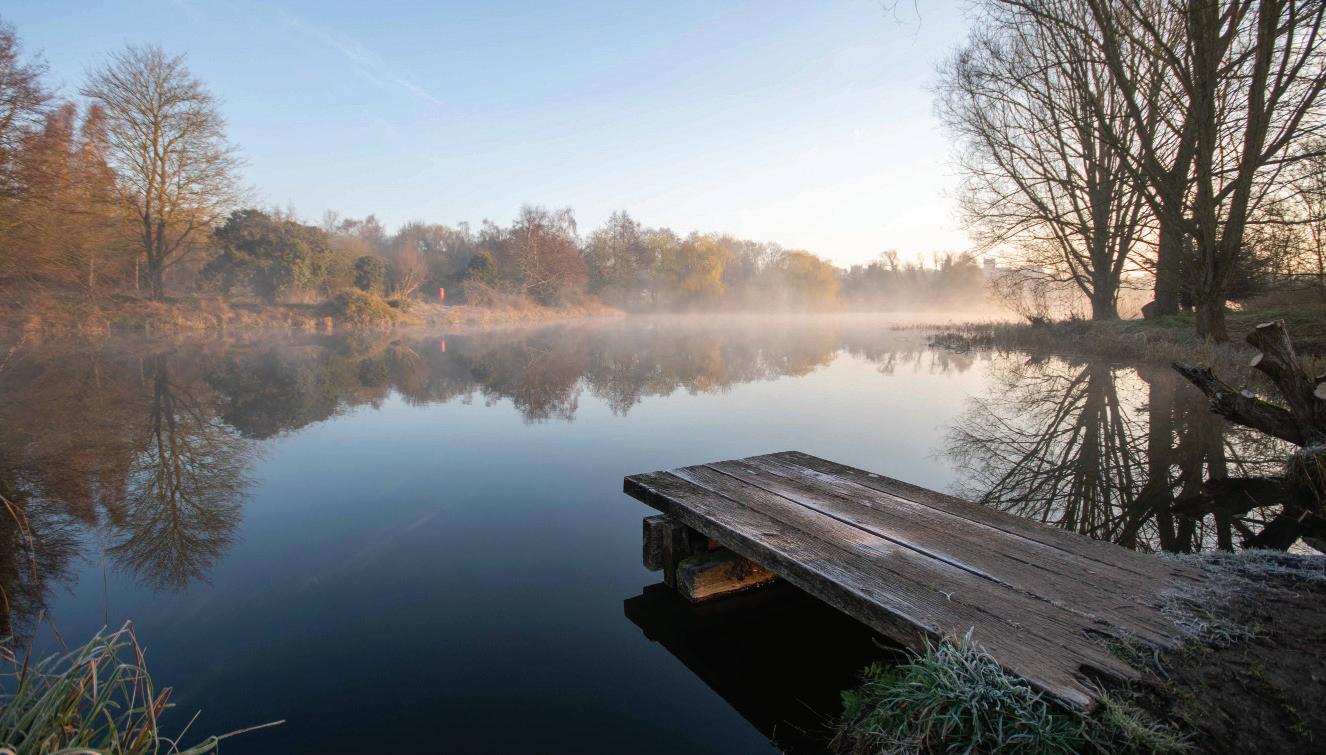
My best advice for freshers is to do with energy management. Don’t get me wrong, I also encourage you to embrace every aspect of university life: join a society, start a new sport, make dinner with your flatmates, explore the town, get a part-time job, venture down Prince of Wales Road. But just don’t let it get too much.
One of the most difficult things I’ve had to overcome at university is learning how and when to say no. Most of the time, saying yes to everything is only going to do you good: it makes people view you as enthusiastic, which is attractive
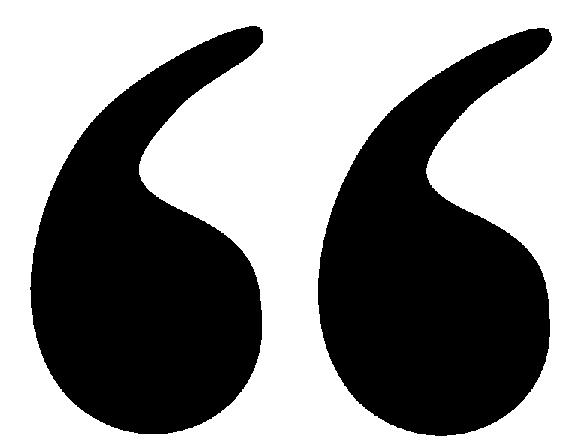
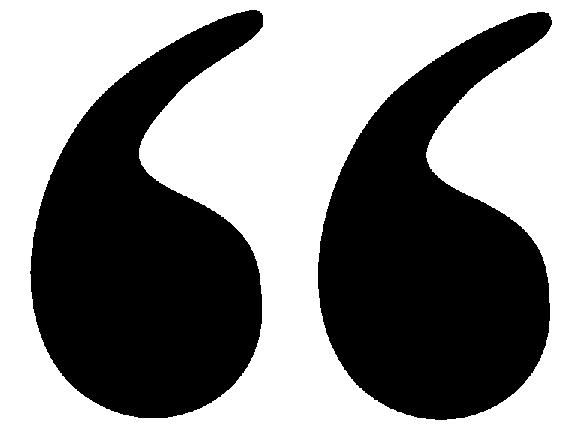
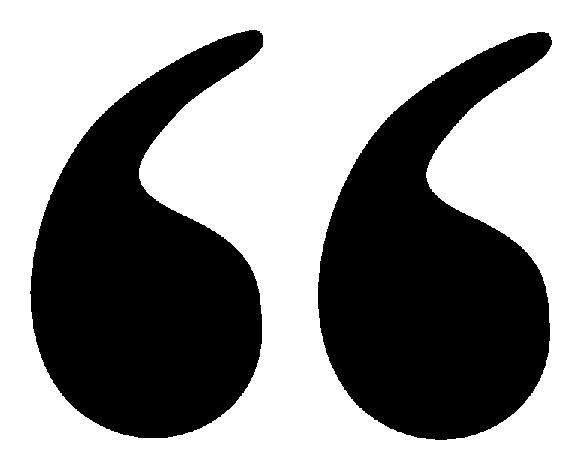
My first year was an especially lonely time for me. I had built up this idealised version, so it hit me even harder when I didn’t particularly bond with my flat. My advice for you, dear fresher, is don’t give up. It can be disheartening seeing your
I had resigned myself to being almost friendless – the two friends I did have were my rocks – as I was also overwhelmed when it came to my course-mates. They all seemed like they knew each other already, or they were incredibly smart

or way cooler than me. It was intimidating, so I didn’t really put myself out there.
And then I finally got over my panic and joined a society at the beginning of spring. I immediately found people who got me, people who I could talk to about anything. Throughout lockdown and my second and third years, my friendships with them became much stronger. Now, going into my Master’s, I still talk to them almost every day.
My only regret? Not joining sooner. So, if there’s a society you think you might be interested in? Go to their welcome event! Message their Instagram. Because that society might just become the best part of your university experience.
when making new friends. It means that you’ll quickly have a packed schedule which makes you feel like you’re making good use of your time at uni. But there comes a point at which you simply need to say no for the sake of taking a break.
The concept of a ‘burnout’ has become all too normalised in
up on us, because we are simply too busy. Sometimes its because we’re afraid to say no. These are the two key bits of advice I have to offer to all freshers, provided you’re getting out there and immersing yourself in university life.
Firstly, pay attention to your wellbeing, both physical and mental. It can be easy to attribute feeling rough to a hangover, when it’s actually something else. If you’re exhausted, maybe you should take a rest day and see how you feel after that.
recent years. Often, it’s because we don’t notice a burnout creeping
Secondly, don’t be afraid to say no. People will give you stick for staying at home or missing a party or event, but if you genuinely need a night in, just take it. FOMO is all in your head, and if you want to make sure
you never miss an event with your new cool friends, trust me: nobody is really as cool as they seem.
Take care of yourself, keep an eye on your energy levels, and give yourself time to recharge when
necessary. Only when you’ve rested enough will you be able to enjoy life to the fullest. Don’t be a people pleaser, they’ll respect you more if you set clear boundaries. And remember, just be yourself.
"My only regret? Not joining sooner."
"First year is the time to meet new people and try new things"
“Don't be a people pleaser; they'll respect you more if you set clear boundaries”
Photo: Concrete
Photo: Concrete
20
21st September 2022
Remember
Kitchen connoisseur or Deliveroo dependent? Eating well at UEA
Eating well at university can be tricky, especially as a fresher trying to navigate a new city, new way of studying and new social circles. In Welcome Week, you’ll be invited out most nights and won’t want to miss out on the fun- but when will you have time to cook? It may even be your first time in a kitchen on your own. Not to worry, I’ve got some tips for you!
First: meal plan and prep! Before you do your weekly Aldi shop, plan your meals so that you reuse your ingredients and aren’t left with a mouldy cabbage in the back of your fridge. This will also save you money, and time as you can prechop your veggies! I’d recommend recycling your sauces too, if you’re especially tight on time or money; a chilli con carne on Monday can become your spag bol on Tuesday.
Secondly, eat a cold lunch! (or use a UEA microwave if you’re fussy- these can be found in the
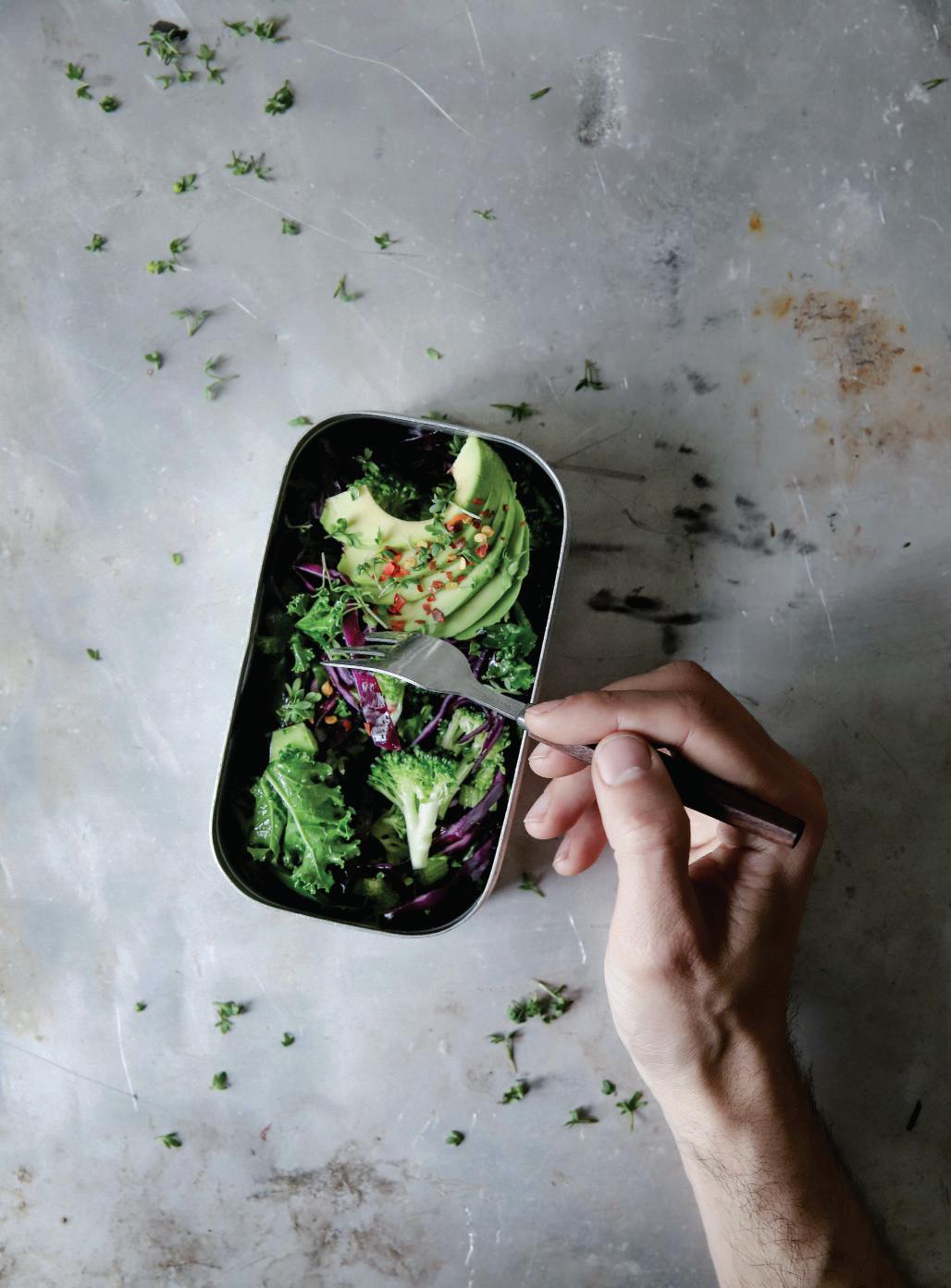
Shop, Hive and Scholars Kitchen). Why? In between lectures you may not have the time or energy to go home and cook, so make some pesto pasta the night before and pop it in a Tupperware box. You’ll enjoy it cold the next day and won’t have to stress between classes.
And finally, shop in-person (not online). Taking a physical trip to Aldi as opposed to doing a Tesco delivery order means you can really shop with your stomach, and that you’re more conscious of what you’re spending- having to physically insert a card or hand


fancy as you browse the aisles than ordering a Just Eat a couple of times a week.
I offer these tips as a second year, with several jobs and a mobility disability, who is armed with a range of cheap and quick meals. When I first came to university, I tried to budget my shop too heavily, and ended up paying the price for it later with last-minute orders. As a result, my eating habits weren’t consistent, and my mental health started to drop. Don’t underestimate the power of a good diet!
over cash. It is much more cost and time effective if you treat yourself to a pudding you really
If there is one last word of advice I can give those moving into new accommodation, it is to have a well- stocked spices cupboard with herbs and seasoning. These can turn a boring fried egg into something sensational, in a matter of minutes. Most importantly, I implore you to find joy in your food and pleasure in the process of cooking it; tune in to Sounds of the Seventies and have a singalong- it'll make your meal even more delicious.
Libby Hargreaves Editor-in-Chief Combatting culture shock in Peru
Lily Boag Deputy Venue Editor
Over the summer, I spent a month teaching abroad in Peru. It was the first time I had travelled to South America, and it was an adventure of a lifetime. Journeying on horseback up the Rainbow Mountains and hiking up the trail to the citadel of Machu Picchu, I quickly realised that travelling across the globe with a group of strangers was the greatest decision I had ever made. But away from the comforts of my home country, it took a long time to adjust to the Peruvian culture and lifestyle.
Watching travel documentaries or reports on the news, you learn, to some extent, what you should expect when visiting a developing country in Latin America: high poverty rates, economic instability, poor living
conditions, or little access to clean drinking water. But flying over the North Atlantic Ocean and across the Amazon jungle and driving from Cuzco Airport to the small town in the Sacred Valley which would be our home for the next month, I was shocked by how naïve and vulnerable I felt in my new surroundings. A different language, a different culture, a different lifestyle, the experience opened my eyes to the real world.
Looking out of the backseat car window at home, the ground meets the sky at the horizon. In Peru, the ground reaches up to swallow you whole as it stretches into magnificent mountains. Derelict half-built houses sit in front of rolling yellow hills tucked in front of snow-capped mountains. On the streets, tuk-tuks honk and beep as they swerve around each other on the roads. Shops spill onto the pavements where stray dogs wander. Food markets overflow with produce. Indigenous women dress in traditional Andean clothing, wearing vibrant hats, wool jackets, and embroidered skirts.
Arriving at our hostel, I realised that altitude sickness was the real deal as headaches and dizziness set in, combined with breathlessness and fatigue. Once the sun dipped behind the mountains in the evenings, packing our summer wardrobe left us

shivering as the temperature dropped by twenty degrees. With three of us crammed in the back of a tuk-tuk one afternoon, driving fast past the left turning to our hostel, we knew we were struggling with the language barrier when we couldn’t say ‘stop’ in Spanish.
Luckily, the Peruvian locals couldn’t be more friendly. Day by day we began to learn more of the language: scanning a café menu, reading road signs, and ordering fruit and veg in the market. When we walked into the school playground to teach for the day, the children embraced us with hugs and smiles. But the challenging reality of life in rural Peru hit harder once we learned that some children couldn’t read or write in Spanish because Quechua was their first language, and others experienced dental issues because they didn’t brush their teeth.
Though there was little we could do to make permanent, impactful changes, instead we focussed on working with the children, inspiring and motivating them to learn. In return, they taught us to celebrate what we have in our lives, and not what was missing. They encouraged us to laugh, play, and dream like a child again. Patience, understanding, and a willingness to learn helped us overcome every challenge.
"I implore you to find joy in your food and pleasure in the process of cooking it"
Photo: Unsplash
Photo: Concrete
"Travelling across the globe with a group of strangers was the greatest decision I had ever made"
21st September 2022 21
concrete-online.co.uk/category/travel/ | @ConcreteUEA
NASA delays ArtemisRocket Launch
George Barsted Science Editor
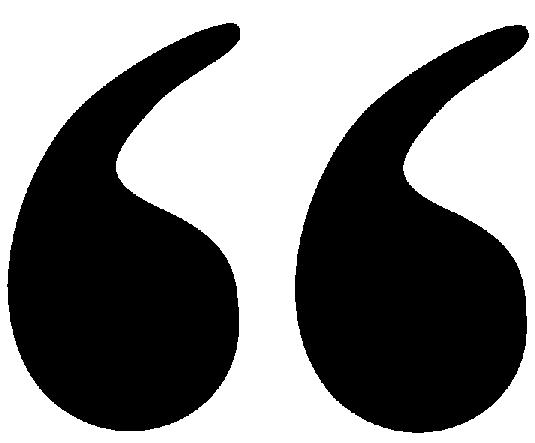
Technical problems have delayed the flight of NASA’s Artemis mission.
The Artemis Mission aims to return humans to the moon by 2025 but has stuttered at the first hurdle with two separate attempts at launching shelved due to fuel leaks.
The uncrewed flight was due to launch on 23 September. A second attempt on 27 September also failed, forcing NASA to return to the drawing board.
The cause of the first failure to launch was a sensor issue that meant it was difficult to tell whether one of the rockets was being cooled effectively. The second delay was caused by a hydrogen leak in one of the fuel tanks.
Experts are saying this method of planning a mission is seen as a last hurrah for NASA’s old way of doing things. As space travel becomes more commercial, NASA funding its own mission bucks the trend of the space industry.
Currently dominated by SpaceX and Blue Origin, the space industry is focused on reusable rockets and making space travel commercially viable. The rockets in this mission are not reusable
but they do make use of old parts from the space shuttle mission, repurposing engine parts to help save money. The end goal for all these missions is to provide the ability to travel to Mars in a viable way.
The Space Launch System (SLS) was designed by NASA
The goal for NASA is to establish the Artemis program on the moon, paving the way for further exploration of Mars. The next Artemis flight is in 2024, and the final flight is to the south pole of the moon in 2025.
India, China, Japan, and Israel have all recently announced plans for moon exploration, some with scientific and others with business goals. Space tourism and asteroid mining are just some of the ideas that companies have to monetise the moon.
and is more powerful than the Saturn V rockets that were used to launch the Apollo missions.
It is over 30-storeys high and is the centrepiece of the programme that cost over $93.5 billion. The rocket itself has taken over 11 years to get to the launchpad, twice the amount of time the original Apollo missions took.
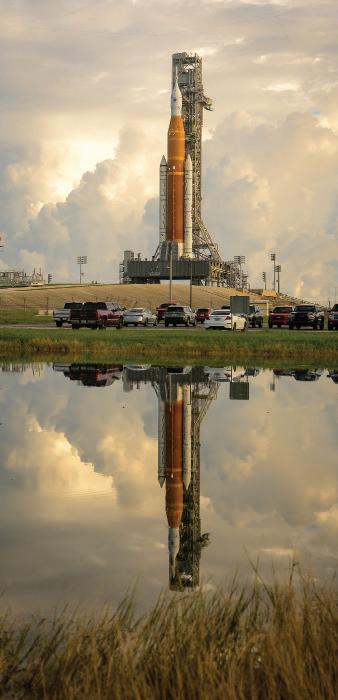
The slow rate of progress is a sign of the times for modern space travel. Commercial companies dominate the landscape, with rocket ships and space exploration a hobby for billionaires to indulge themselves in.
The NASA mission aims to put the first woman and person of colour on the moon. It hopes that establishing a base on the moon can inspire the next generation of astronauts.
So far, with two failed launches the mission risks becoming an embarrassment for NASA as private companies sail past in terms of progress with launches.
The public appetite for space exploration has waned since the heyday of the late 60s, but Artemis aims to re-energise the enthusiasm around space exploration by going to the moon and beyond.
Bizarre Science: The Return of the
Tasmanian Tiger
Becky Sainty Science Writer
The last known thylacine, also known as the Tasmanian tiger, died in 1936. Although unverified sightings continued, the species was declared extinct in the 1980s. It was Australia’s only marsupial apex predator, whose range was restricted to Tasmania 3000 years ago before being hunted to extinction by colonists. This made it one of the 39 Australian mammal species to become extinct in the past 200 years.
A new project launched by Colossal, a Texas-based biotechnology company,
means the thylacine may be brought back from extinction within ten years. In partnership with the University of Melbourne, they will use a $5 million gift to establish the Thylacine Integrated Genetic Restoration Research (TIGRR) Lab, headed by Professor Andrew Pask. They believe the reintroduction of this apex predator could rebalance the ecosystem and help combat the extinction of other species.
The project will use the thylacine genome sequenced from a juvenile specimen in a museum collection. This genome will be recreated through gene editing stem cells from a related species, the fat-tailed dunnart. These cells can be then made into
an embryo to be grown in a surrogate dunnart or an artificial womb. Professor Pask believes that artificial womb technology can be developed for marsupials due to their small size and short gestation period. Once born, the thylacines will be introduced on private land in Tasmania before their return to the wild.
This would be the first time an animal had been brought back from extinction. There are many technical challenges, including the fact that 5% of the thylacine genome is still missing. However, this is all from repetitive sequences that the team believes will not have a great impact. There is also still a lot unknown about the thylacine. For example, a 2020 study suggested they weighed half as much as previously thought, changing conclusions about what they
hunted and impacting the role they would play in the current ecosystem.
The practicality of reintroducing the thylacine has similar considerations to re-introducing species to old habitats, which has had both successes and failures. To be sustainable, populations need to be large and genetically diverse, which will be achieved here by sequencing and recreating genomes from up to 100 individuals. The thylacines will also need a large area to roam, and although the researchers claim the habitat they occupied still exists, it is unclear how it changed in their absence.
This process will also be very expensive for only one animal, and as conservation is often limited in funds, arguably this money could have a
greater impact elsewhere if the funders supported other projects instead. And unfortunately, de-extinction just does not address the fundamental issues causing many species to go extinct, which may limit its long-term impact.
Despite all this, it is an intriguing project, which could provide an effective solution for certain ecosystems. It would be the first of its kind and prove the effectiveness of many different techniques. The technology it develops will certainly be useful more widely, such as for increasing genetic diversity in existing species. It would give us the chance to see a real thylacine, and understand how it existed for thousands of years.
“The Artemis mission is seen as a last hurrah for NASA’s old way of doing things”
Photo: Wikimedia Commons
Science 21st September 202218
Climate Change Corner : The Water Crisis in England
George Barsted Science Editor
In the driest summer in over 50 years, a state of drought has been declared over large swathes of England. The Environment Agency declared a state of drought for eight of England’s 14 areas. The driest July on record led to increased demand for water both commercially and domestically. Coupled with rivers, reservoirs, and lakes at increasingly lower levels it has led us to a state of crisis.
million people and ask the public to use water sparingly. The outcomes of this type of drought can be catastrophic if action isn’t taken. It’s predicted that over half of this year’s potato crop will be lost due to the inability to irrigate it properly. The impact on food security in this country will be vast and lead to further reliance on overseas imports which in turn produce more pollution. In turn, prices will rise in an already fragile economy and shortages are likely to be expected.
The response to the recent heat waves and state of drought has been to impose hosepipe bans that are impacting more than 7.4
To understand the drought and how we got here, it is necessary to look at the conditions that caused it. It has been over 30 years since the privatisation of the water industry, gone are the days of nationalised control over the water system. In its place is a cabal of water companies underinvesting in a vital resource. Thames Water, which supplies the whole of London, has a chief executive who earns £750,000 per year. The same company admits it loses
more than 600 million litres of water a day, enough to fill 240 Olympic swimming pools. Across England, 26% of water is lost in leaks due to poor infrastructure but the top bosses at the water companies have earned over £34 million in the last two years.
Photo: Wikimedia Commons
Coupled with erratic weather patterns due to climate change and with the planet becoming hotter and hotter, it is a perfect crisis unfolding before us. This will not be the last drought in England and nor is it the first. But the severity and frequency of these situations are going to get worse unless something is done. As the water industry screams out for genuine investment in a utility that everyone uses it appears to fall on deaf ears. A major reservoir has not been built in this country since 1981 with the Kielder Water dam.
Being able to store fresh water is essential, the last two winters have been 9% wetter than previously recorded. Across England, we have the water just not the ability to store or distribute it efficiently.
It may be easy to look at the long, hot summer as an aberration. But this heatwave has only highlighted the potential mess we could be in if strong action isn’t taken. Faced with a growing population, dwindling supplies, and increased demand, there is a real danger that a water crisis could become a part of our daily lives.

UEA Scientists Fly Through the Arctic
George Barsted Science Editor




UEA researchers have taken part in an international effort to understand the impact of storms on arctic sea ice levels. The researchers, from the UEA School of Environmental Sciences, have been flying from the Norwegian Arctic in an attempt to understand how summer cyclones interact with sea ice.
a detailed picture of how the ice and sea interact with the atmosphere.
Professor Ian Renfrew stated “Recent decades have seen a dramatic fall in Arctic sea ice area and cyclones appear to both slow down and speed up the ice decline, depending on the time of the year. The physical processes are unclear and one of our aims is to investigate the impact of the cyclones on the sea ice and the impact of the sea ice distribution on the cyclones.”
ground.
Arctic summertime cyclones can last for weeks and are largely unstudied concerning their effect on the climate. They can measure thousands of miles in diameter and last for multiple days. The study hopes to be able to make light of dramatic changes in arctic sea ice, expected to be a key driver in climate change. As more and more sea ice melts, ocean levels rise causing havoc across the globe.
UEA Wins Green Flag Award for Sixth Year Running
UEA has been awarded the prestigious Green Flag award for the sixth year running in honour of the green spaces on campus. The Green Flag accreditation is the quality mark for parks and green spaces and declares that the campus has the highest environmental standards.
Sites team, who work all year round. This year has been particularly taxing, with long bouts of hot, dry weather meaning extra care has had to be taken for more vulnerable species.
This is the first type of research that has been done of its type for summer cyclones. Flying with light aircraft into the arctic circle and helping to create
Due to the impact of climate change, sea ice has become thinner across large parts of the arctic, meaning wind can move it more easily. This has both long and short-term results for climate models in the northern hemisphere and worldwide. The flights from a base in Svalbard, Norway are focused on taking measurements of turbulence, moisture, and temperature in the atmosphere. The flights which took place between 27 July to 24 August, hope to link this data to information about the sea ice on the
The results of the study have yet to be published but the work, which has been funded by various partners including UEA and the British Antarctic Survey, hopes to develop a more comprehensive climate model of the arctic. This research coming in the 50th year of the Climate Research Unit at UEA helps to highlight some of the groundbreaking work that is going on at the University.
The 360 acres at UEA boast almost 6000 distinct species of plants and animals including 108 rare or endangered species. The Green Flag award highlights the great biodiversity and cleanliness of the campus, from the broad to the bluebell woods. The campus boasts six wildlife trails and takes in the grounds of the 16th Century Earlham Hall and the brutalist design of the Lasdun Teaching Wall. Winning the award is a testament to the demanding work of the Grounds and
Tom Everett, the UEA Landscape Manager said, “It’s always hugely gratifying to receive a Green Flag award, and the dedication of our Grounds and Site team is the reason that it’s possible to receive such an accolade, so all thanks go to them”.
Enjoying the sights around campus is encouraged this year, and whilst the weather still stays pleasant and warm it is a great idea to get out and about. Go rabbitspotting by the lake or have a wander around the gardens of Earlham Hall, it’s time to enjoy our award-winning campus.
“driest summer in over 50 years”
“it is a perfect crisis unfolding before us”
George Barsted Science Editor
“top bosses at the water companies have earned over £34 million in the last two years”
“understand how summer cyclones interact with sea ice”
1921st September 2022 concrete-online.co.uk/category/science/ | @ConcreteUEA
Changing the game: what the Lioness victorymeans for the future of women’s sport
Libby Hargreaves Editor-in-Chief
England’s Lionesses were launched into the spotlight when they won the Euro 2022 final on 31 July 2022, schooling Germany in the art of a cool-headed performance with a 2-1 victory.

Sarina Wiegman’s team performed in front of a record-breaking crowd of over 87,000- firmly pinning women’s football on the map. The glory does not stop there.
Our Sports Editor covered the match, explaining “It was a tense start to the game, but it was England who started the better...The first half finished 0-0 with chances
falling to both sides but neither able to finish them...Toone produced an audacious shot that lobbed the ball over the German keeper and sent Wembley into pandemonium for the first time in the night.... but a wonderfully executed goal finished off by Magull brought Germany level and sent the game into extratime. Hemp finally delivered a corner that resulted in the ball falling to Chloe Kelly to poke home and finally the England fans could begin to believe they’d done it.”
Lauren Hemp, 22, performed brilliantly and made her hometown of North Walsham, Norfolk, proud. Her corner set-up Kelly’s winning strike, less than a year after she scored her first four goals
for England (in November 2021, contributing to the record 20-0 win against Latvia).
Having started her career in 2008 at Norwich City, the whole county gathered in support - watching matches from pubs, community centres and one another’s homes.
After her win, she was given the Freedom of the Town by North Walsham’s mayor Garry Bull, brimming with pride as she looked onto her hometown, saying “The sky is the limit, I am just going to keep working hard, stay focused and see how far I can go, with the European Championship complete, next is the World Cup - I don’t see why we can’t win that too.”
According to MediaVision, since the Lionesses defeated Germany online interest in the star players of the Euro final has topped one million searches. This is over a 2000% increase, with team captain Leah Williamson at over 235,000 searches and Golden Boot winner Beth Mead at over 56,000.
The CEO of MediaVision described the power of the win. “Since the start of the Euros, we’ve seen an exponential increase in searches for our Lionesses, who finally brought football home. Many of the players were unknown but have quickly become household names.”

When England’s men’s team last won a major tournament, women weren’t allowed to play football professionally. Now, over half a decade on, the Lionesses have brought the game home for the nation.
The evolution of women’s sport in general is evident even in the past
decade alone. In 2012, 20.1 million people viewed domestic women’s sport - which had risen to 32.9 million by 2021. The Euro 2022 win will surely increase this figure even more.
Broadcast viewership of sport is on the decline in general, but the men’s Tour de France remains the most watched sporting event in the UK. Women’s cycling viewership figures do not compare, however rises in women’s Olympic sports, tennis and football all indicate a positive trend.
Women’s professional sport was born much later than men’s, so has a lot of catching up to do in terms of audience and investment - but should it reach the dizzying heights of the male game?
Taking men’s football as an example, the sheer amount of money in transfers alone tells us how much money is pumped into the game. This also means there is more investment in the grassroots players, and more representation for youngsters interested in the sport. However, players are getting paid an average of £50,000 a week (according to the PFA). I would question whether it is moral for the women’s game to aspire to this.
We have many more women’s sporting events to look forward to: the World Track Cycling Championships, London Marathon, Rugby Union World Cup and much more.
Financial Powerhouse: A Premier League Problem?
Alfie Green Sports Writer
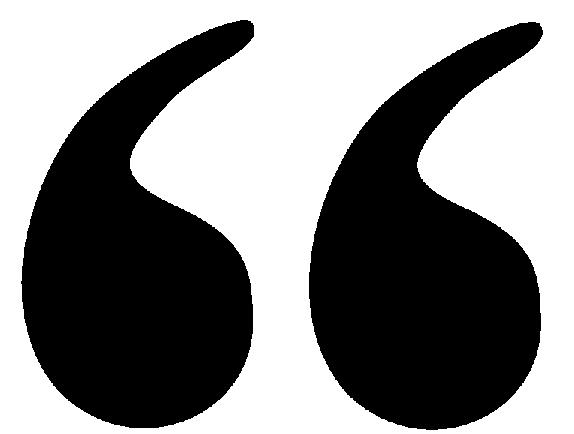

Financially, the disparity between the English Premier League and the other top European leagues has never been so drastic as it is now.
Summer spending reached the heights of £1.92bn for Premier League clubs, more than the other top five European leagues combined (with the Premier League being responsible for 49% of the spending).
The impact of this you would expect would mean the Premier League was far above the quality of the other leagues, but is this true?
Well, the best barometer to consider this would be looking at European competitions, and how English clubs compare. You would expect English clubs to dominate, but there has only been 2 English winners since 2013.
It must be said this shows English clubs have improved their performances in Europe, an English club didn’t reach a
Champions League final for 6 years until 2018, and there have been 6 finalists and 2 winners since then.
The financials have no doubt influenced these performances, allowing huge transfers such as Van Dijk and Alisson Becker to Liverpool before their 2019 win, and Chelsea spending heavily the summer before their 2021 win, but this doesn’t scream unfair dominance.
There is an argument that the real issue of the spending in the Premier League is the gap between the top teams and those below.
The example of our local side Norwich City is perfect to see the issue. Norwich have spent
the previous four seasons being promoted, relegated, promoted and relegated again.
The issue is clearly that promoted clubs often struggle to cope with those sides that are already prominent in the league and most clubs now have superb financial support. It’s sadly the case that sides like Norwich, with their owner Delia Smith, cannot afford to survive, and end up yo-yoing between the Championship and the Premier League.
What does this tell us? We know the Premier League’s spending is extreme, but it is widely recognised as the ‘best league in the world’.In terms of competitiveness for promoted teams it is difficult to survive,
although some sides that come up do spend (Nottingham Forest this year for example) but often it still isn’t enough.
I think that even with all the money in English football, it does come down to how well you spend it.
“Summer spending reached the heights of £1.92bn for Premier League clubs”
Photo: Unsplash
Photo: Unsplash
21st September 202222 Sport
Serena Williams retires from Tennis, but not before changing the sporting landscape
George Barsted Sports Writer
At the age of 41, Serena Williams has announced she is “evolving” away from the game of tennis. With her exit at the hands of Ajla Tomjanovic at the US Open, it seems the door is closed on her playing career. Widely considered to be the greatest player the women’s game has ever seen, her career encompassed 23 major singles titles and finished with 319 weeks spent as world number one.
Williams’ story sometimes seems too good to be true. Growing up she played on the courts of Compton, with her equally talented sister Venus. Her father declared when Serena was nine, that she would one day win Wimbledon against her sister. At the time this was dismissed as a bombastic prediction from someone with little knowledge of the game.
If anything, Richard Williams’ predictions were rather timid. Serena won Wimbledon seven times, beating Venus in the final on three occasions. Her statistics have her in a league of her own, she has winning records against Sharapova, Azarenka
and Hingis. Players who would be considered greats in the era if not for Williams’ complete domination of them.
Photo: UEA Rugby
But Williams is not solely represented by what she has achieved on-court. She came back to play professional tennis after the birth of her daughter (she was eight weeks pregnant when she won the Australian Open).
She suffered a pulmonary embolism during childbirth and still managed to reach the US Open and Wimbledon Finals on her return to the game. It’s this perseverance and determination to achieve that has been a hallmark of her career.
Tennis before Serena Williams and after Serena Williams are different games entirely.

The post-Serena Era ushered in equal prize money for men and women at Wimbledon and Roland-Garros, greater TV coverage and bigger commercial deals.
In America, she paved the way for a generation of African American women to take to the stage. Sloane Stephens, Madison Keys and Taylor Townsend all credit Serena for inspiring them.
Teenage sensation Coco Gauff has described Williams as her “idol”.
Before the Williams sisters took
to the arenas at grand slams, tennis was largely seen as a stuffy, white and privileged game. Breaking down barriers was not easy for the Williams sisters, the family suffered racist abuse at the Indian Wells Tournament leading to a 14-year boycott of the event.

Williams has been criticised for her hair, her outfits, her lifestyle and her on-court behaviour. The accusations are at times ridiculous but frequently crossed over into racist and sexist attacks.
When male players broke racquets on the court they were heralded often as passionate and fanatical about winning. When Serena Williams questioned line calls or spoke loudly, she was often mischaracterized as aggressive and uncontrollable.
Tennis still has a way to go in breaking down stereotypes and opening up the game for all. But as the final light fades on her playing career, Serena Williams can look back and say she didn’t just open the doors but broke them down and became one of the greats whilst doing it.
LIV Golf, the controversial tour that has everyone talking and Tiger Woods and Rory McIlroy’s plan to take back the fans
 Drew Murphy Sports writer
Drew Murphy Sports writer
LIV Golf is a professional golf tour financed by the Public Investment Fund, the sovereign wealth fund of Saudi Arabia. The same fund took over Newcastle United Football Club last year.
LIV stands for the Roman numeral meaning 54, which is the score if a golfer gets a birdie on every hole across the three rounds of 18 holes.

The series began in June with exworld number one Greg Norman as its CEO.
The lucrative prize money and contracts offered attracted players to join despite human rights groups criticising it as an example of sports washing by Saudi Arabia.
The prize for winning the series is $4 million instead of the $2.7 million for the winner of the PGA. They have also offered huge contracts to star players; for example, Phil Mickelson was allegedly paid $200 million and Dustin Johnson
$150 million. British Open winner Cameron Smith, who joined later in August, was given $100 million.
Renowned players have disapproved of the series and the players who have signed up. Rory McIlroy publicly stood with the PGA and criticised LIV players, claiming they took the easy way out. Tiger Woods did the same, reportedly turning down a massive $800 million to play for LIV.
To fight back against LIV, Tiger Woods and Rory McIlroy have teamed up to create TMRW sports as a company that will aim to use technology to attract and cultivate a younger audience for golf.
They then announced the TGL, a new “tech-inspired” golf league in partnership with the PGA.
Launching in 2024, the TGL will consist of six teams of three PGA tour players, competing over 18 holes on a virtual course with a “tech-infused short game complex”.
It will be a 15-week regular season every Monday evening.
There is no doubt that LIV golf has caused golf to be plunged into a civil war, with those standing by the PGA and those turning to the breakaway tour. This has made recent competitions tense as players from both sides meet. For example, the BMW PGA championship is being held at Wentworth, Surrey, with 18 players from LIV.
One of those was Ian Poulter, who was seen having a heated exchange with out-spoken criticiser of LIV Billy Horschel. Poulter was quick to downplay the conversation, but it is clear that there is a lot of tension amongst the players.
It must be said that despite the apparent controversy over LIV golf and where the money is coming from to pay the players, the series has revolutionised golf. Having a different series to compete with the PGA has meant that the PGA must step up its game to keep fans watching.
“Tennis before Serena Williams and after...are different games entirely.”
Photo: Unsplash
Photo: Unsplash
Photo: Unsplash
2321st September 2022
concrete-online.co.uk/sport/ | @Concrete_UEA
UEA Sport and BUCS, What is it All About?
Dan Laughlan Sports Editor
As a new university year begins, so does the thought of trying something new. Typically, this comes in the form of joining a society or club. UEA Sport oversees all the sports clubs at UEA.
UEA Sport say “We pride ourselves on being able to provide a wide-ranging programme of sporting, recreational and healthpromoting activities.”
These range from the more conventional Football, Rugby, Netball and Athletics, to Surf, Mountaineering, Ultimate Frisbee and Korfball.
There are a host of Martial Arts clubs, as well as Dance and Water sport clubs. To find out all the clubs on offer, go to www. ueasport.co.uk.
In order to join one of the clubs, you must purchase a UEA Sport membership which can be found on the UEA SU website.
This costs £55 per year which contributes to the cost of running the clubs such as travel, accommodation and kits.
This membership only needs to be purchased once per academic year no matter how many clubs you end up joining.
UEA Sport at studentsport@uea. ac.uk.
Clubs at UEA participate in BUCS. BUCS (British Universities and Colleges Sport) is the governing body for higher education sport and is responsible for interuniversity sports.

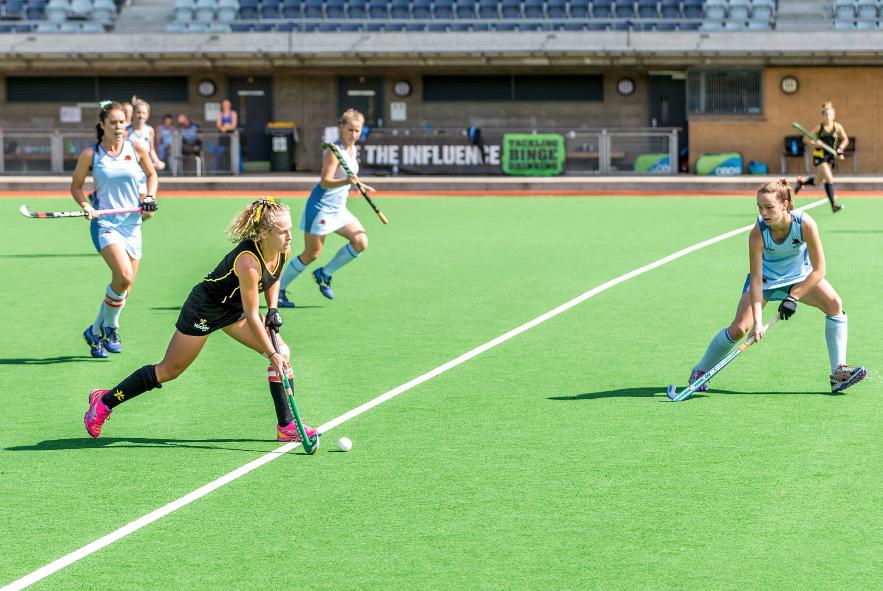
Taking place on Wednesdays, it is the competitive level for university sports and each year sees universities ranked on how
There are a wide variety of clubs you can join at UEA.
Once this membership has been bought, you can join whichever clubs you want. Each club will require a subsequent membership fee, prices vary between clubs. These are also purchased on the UEA SU website, where you can also find out more about each club: when and where they train, committee members and how to contact them.
All UEA Sport physical activity and sporting programmes are open to participants of all abilities.
If you are a wheelchair user or have accessibility requirements, please feel free to get in touch with uea+sport staff who can help liaise to ensure that the activity is adapted to your needs. Email
they performed in each individual sport over the course of the academic year.
We asked UEA Sport if there are options for students who want to be active and have fun rather than compete at competitive levels?
UEA Sport responded “Every student at the UEA is automatically enrolled on a free Active Campus Membership for the duration of their studies.
Membership gives students access to a variety of free and heavily subsidised activities designed to benefit your physical and mental wellbeing. Activities include weekly drop ins and group exercise classes and
walking trails.”
We also asked, how getting involved in sport at UEA can improve a student’s university experience.
UEA said, “Joining a sport club
or taking part is a fantastic way of meeting likeminded people when joining university. All our sessions are led by our student volunteers, who are on hand to answer any questions and discuss any support you may need to participate.”
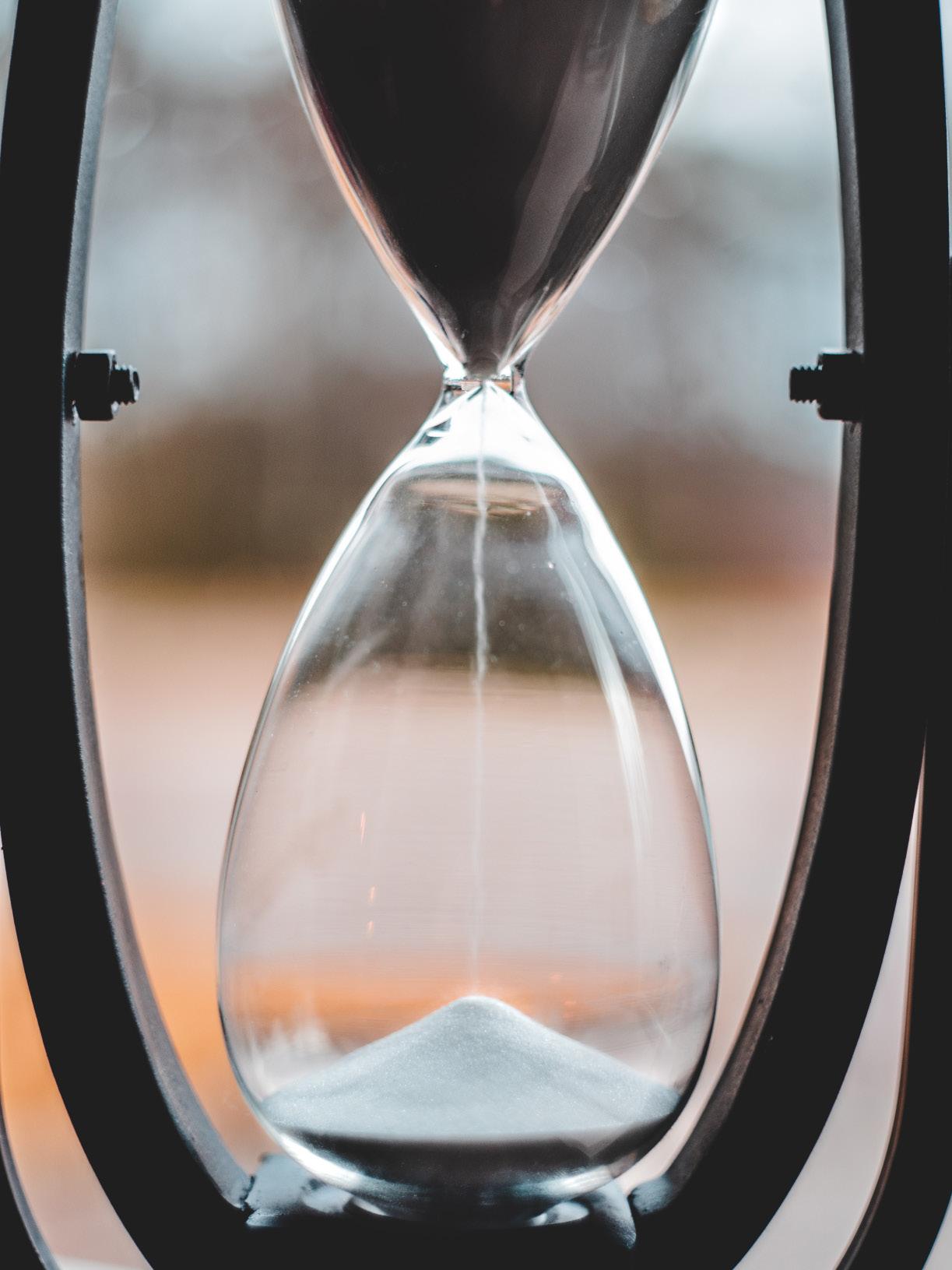
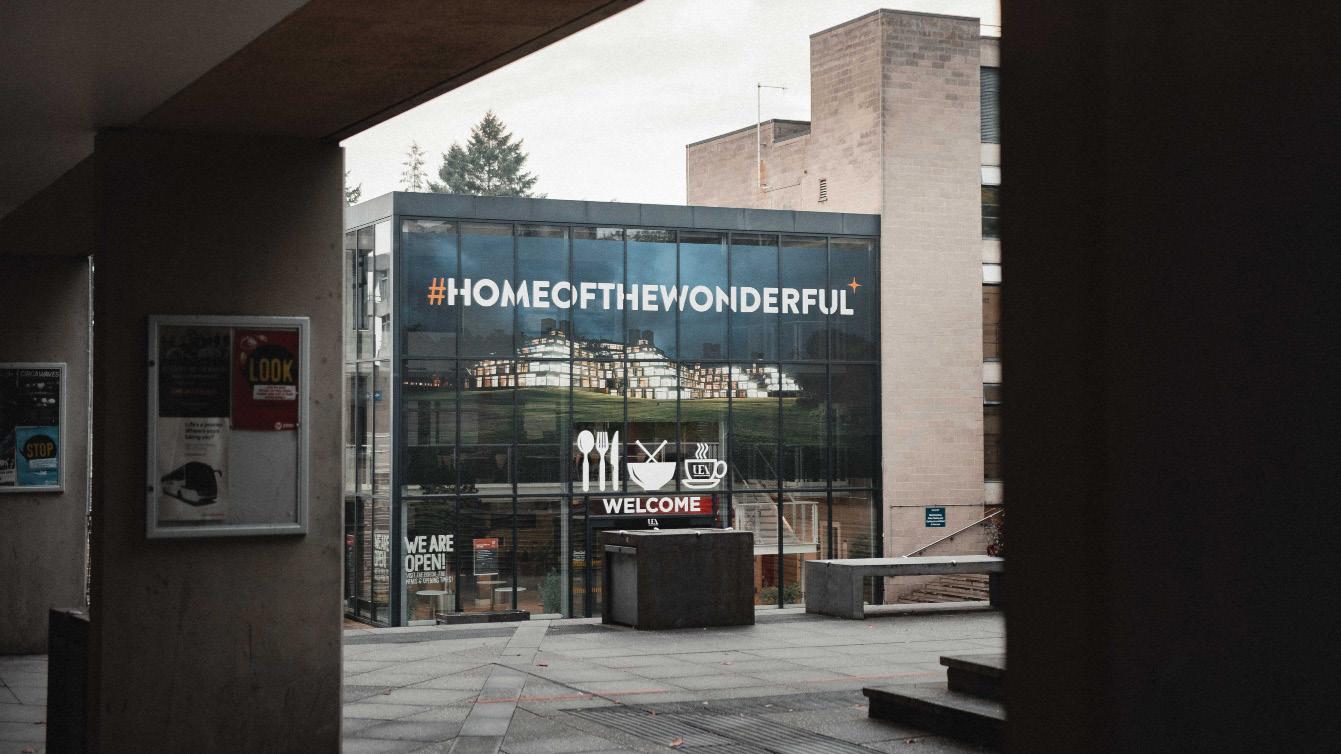
Sporting Dreams? It’s Never Too Late!
Alfie Green Sports Writer
As the new academic year begins, and we welcome a new cohort of students to UEA it’s important to emphasise how many opportunities are available.
Now you’ll be certain to hear all about the various societies and clubs that are on offer here in Norwich, but I want to make a special shout out. I am going into my third year here, but I am yet to join a sports club.

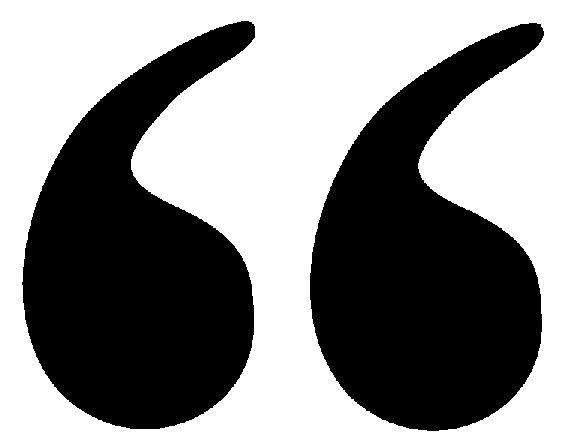
This year will be different though. Maybe I’m experiencing a fear of missing out, scrambling at every chance to tick off my list of things I’ve done here. Why am I sharing this? Well, I want anyone who is new to the Uni, or is in the same position as me to know that it is never too late to get involved and fulfil your sporting dreams.
There are hundreds of examples of

sporting icons who got started late, take for example Arsenal star Ian Wright. Wright was playing Sunday league football until he finally signed professional terms with Crystal Palace in 1985, just three months before he turned 22 (as someone who has just turned 22 does this mean I still have a chance?) and went on to have an incredible career.
Wright won a Premier League, an FA Cup, the League Cup and a European Cup Winners’ Cup with Arsenal, whilst scoring a total of 239 league goals in his career.
Another example of a late starter is legendary boxer Rocky Marciano, who didn’t have his first professional fight until he was 25, yet went on to have a professional record of 49-0-0 (with 43 knockouts) and defended his heavyweight title 6 times after winning it.
Marciano had a series of amateur
fights whilst he was in the army, but by no means was he a child prodigy.
Who knows, maybe if you went along to UEA Boxing you could become the next real life Rocky. What I’m trying to get at here is that you may be new to university, or you may not have ventured in the UEA sports club world, but no matter your age it’s never too late to take part!
By no means am I saying you’ll become a Premier League top scorer or heavyweight champion of the world, but you may just meet some friends for life, have a great time, get fitter and learn some new skills all at the same time.
These are certainly my hopes going into the new year, and I hope you can join me!
“All UEA Sport... programmes are open to participants of all abilities”
“Joining a sport club...is a fantasic way of meeting likeminded people”
Photo: Concrete Samuel Baxter
Photo: Unsplash
Photo: Unsplash
Photo: Unsplash
“Meet some friends for life, have a great time, get fitter and learn some new skills”
21st September 202224
Sport
